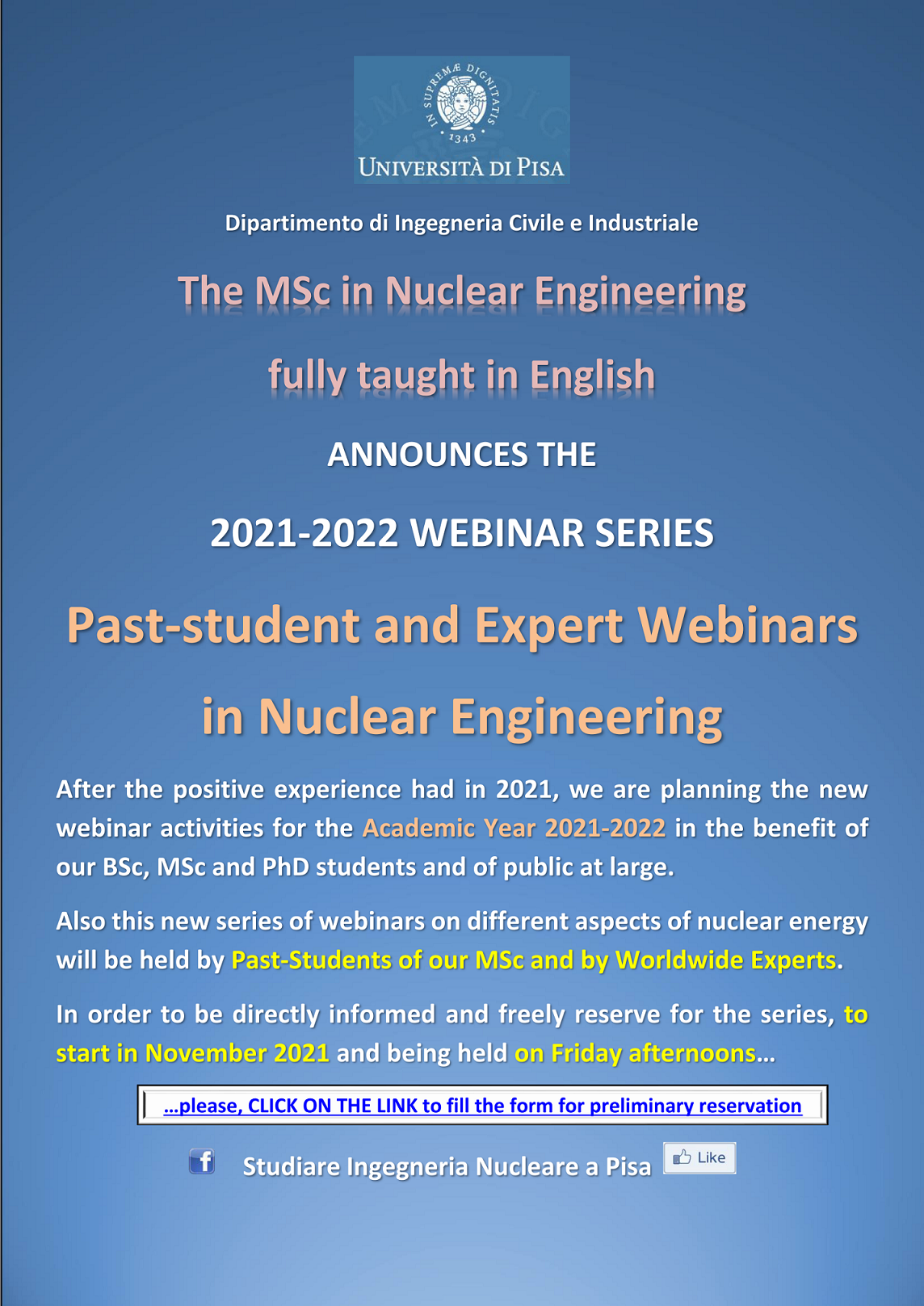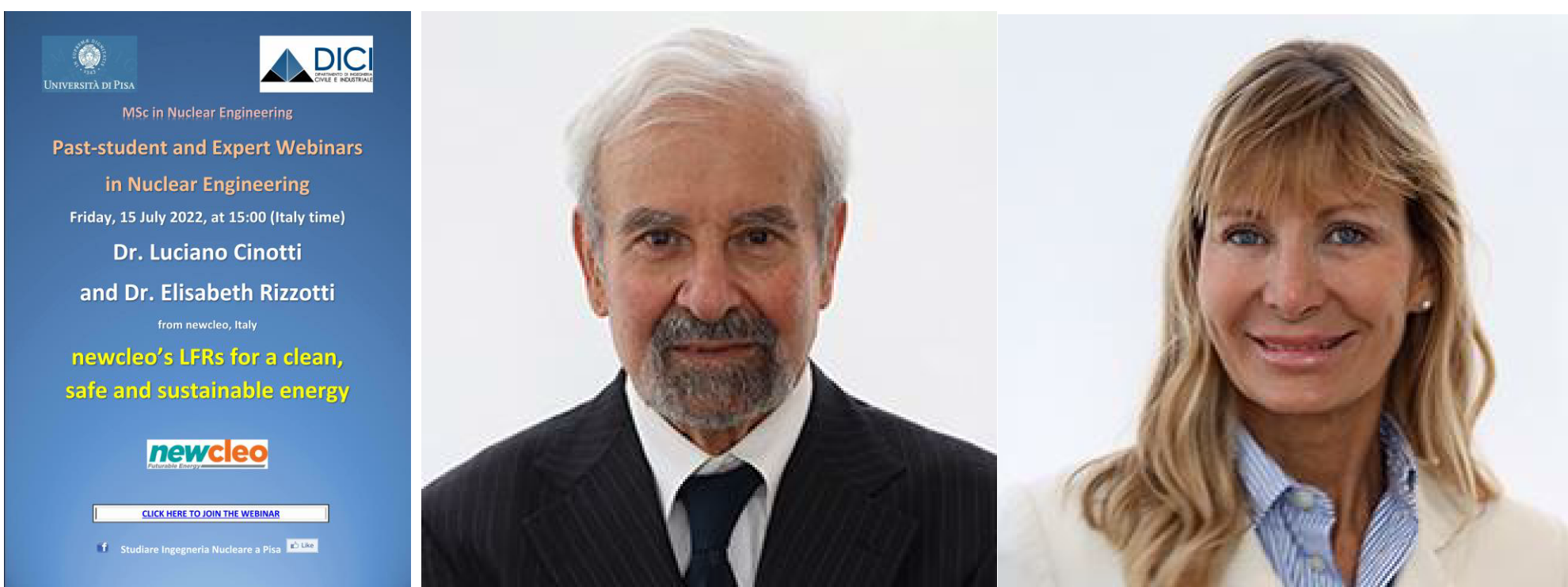NOTE: The webinars are free and open to students of any home institutions as well as to the general public.
Feel free to spread the announcements and the links to anybody possibly interested.
List of planned webinars with links to lecturers CV (click on each line)
Webinar by Enrico Deri on Friday November 12, 2021 at 15:00
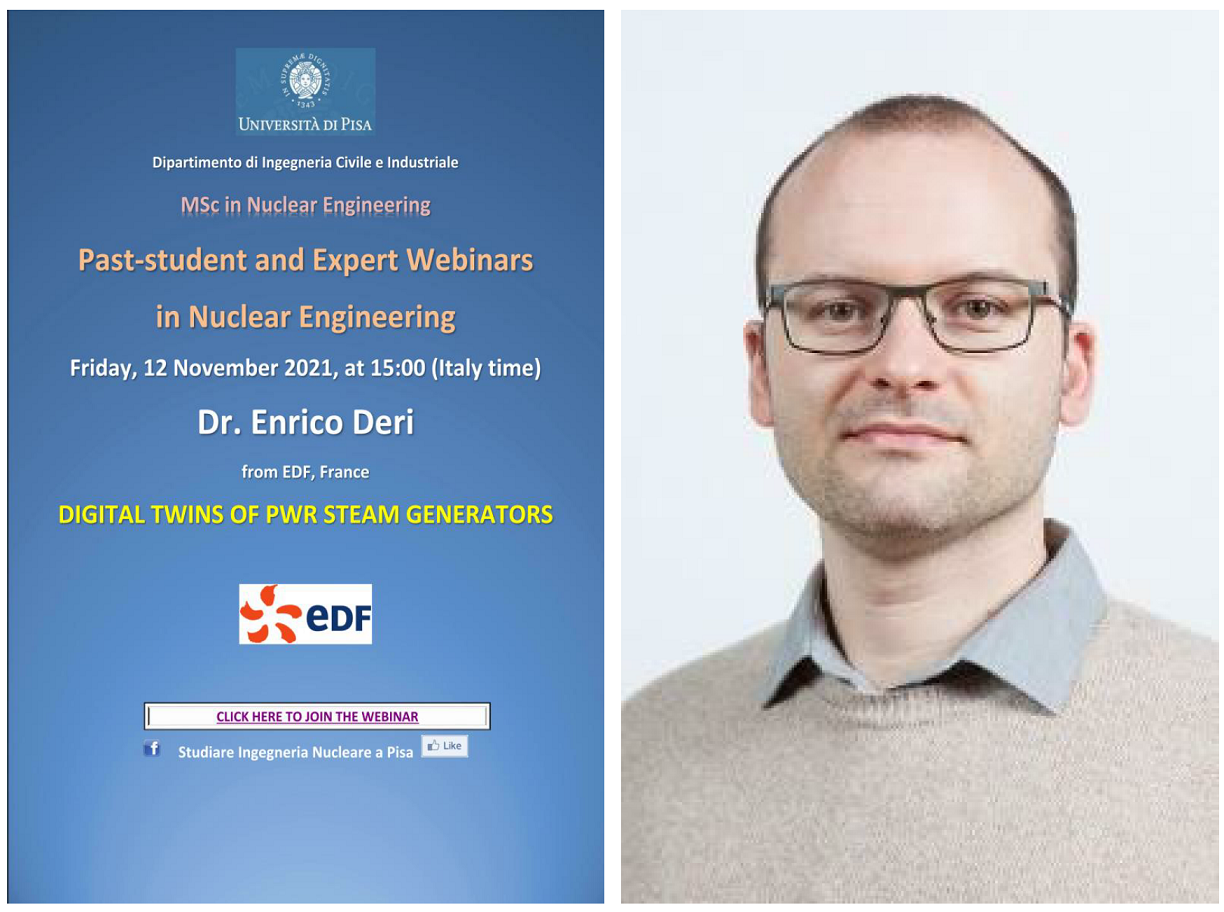
Enrico Deri works as project manager in the R&D division of EDF company. He obtained a MSc in Nuclear Engineering from University of Pisa in 2006 and the EMSNE (ENEN) certificate in 2007. In 2009 he got his PhD in fluid mechanics from CEA Saclay and Sorbonne University (formerly Pierre et Marie Curie University). After a Post-Doc on fluid-structure interaction at the Fluid Mechaincs Institute of Toulouse (IMFT), he joined EDF in 2011 to work on steam generators.
Webinar by Luis E. Herranz on Friday November 19, 2021 at 15:30
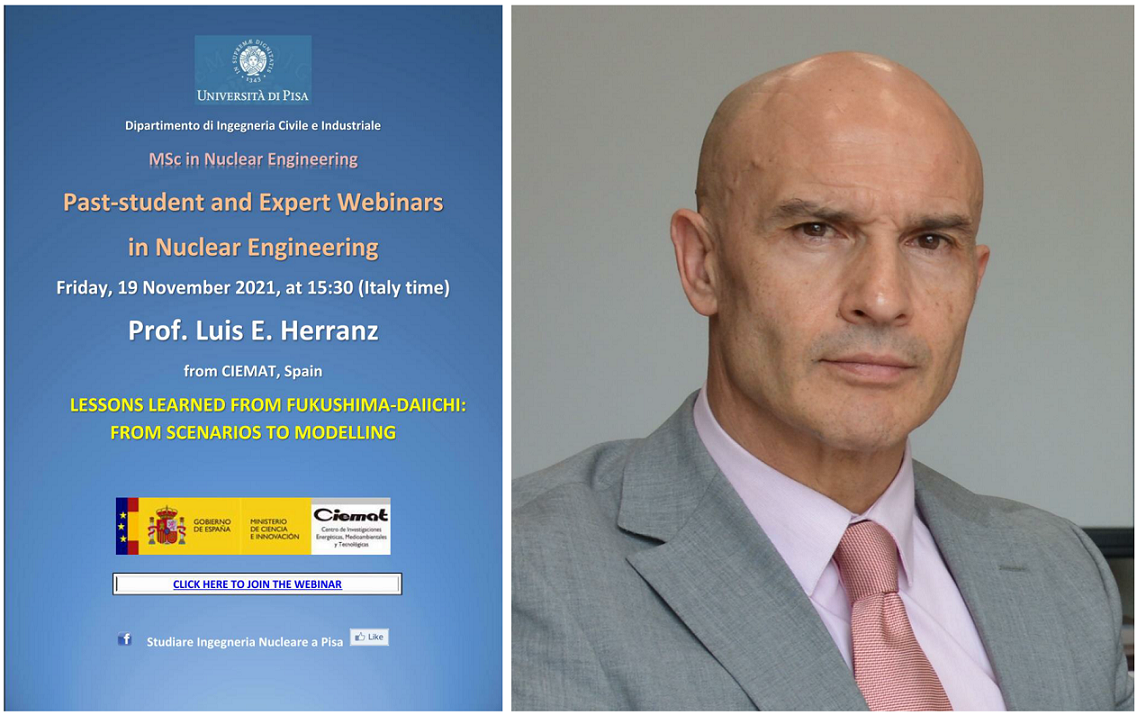
Luis E. Herranz has led the research group on Nuclear Safety in CIEMAT since 1999. He graduated in Quantum Chemistry (1986) and did a master on Nuclear Engineering at the Instituto de Estudios de la Energía in 1987. He defended his PhD thesis on Thermal-hydraulics of passive systems in 1996 and in 2016 he became Research Professor on Nuclear Safety, the highest category in Spanish research scale. Among his fields of interest are: Severe Accidents, Thermal-hydraulics of advanced nuclear systems, Thermo-mechanics of nuclear fuels and Safety and power cycles of IV Gen reactors. As a result of his research he’s published more than 100 papers in refereed journals and has made more than 200 contributions to international conferences and congresses.
At present, after more than 30 years of professional career, he has been Chairman of the OECD-NEA Working Group on Analysis and Management of Accidents (WGAMA) since 2015 and after several years coordinating the Sub-Technical Area on Source Term within SNETP/NUGENIA, he became Leader of the entire Technical Area 2 on Severe Accidents in 2018. In addition, he is a member of several expert groups of OECD/NEA on Fuel Safety (WGFS) and Reactor Fuel Performance (EGFRP).
Along his career, Luis E. Herranz has collaborated in Universities and national and international graduate, masters and post-graduate courses. He was Co-Director of the Master on Nuclear Engineering and Applications (MINA) for 10 years, organized by UAM/CIEMAT, Professor at the Department of Mechanical Engineering of UPCO (ICAI) on Heat Transfer and on Energy Technologies for another 10 years. Presently, he is a lecturer in a number of masters and post-graduate courses related to nuclear energy and energy technologies.
Webinar by Henri Paillere on Friday November 26, 2021 at 16:00
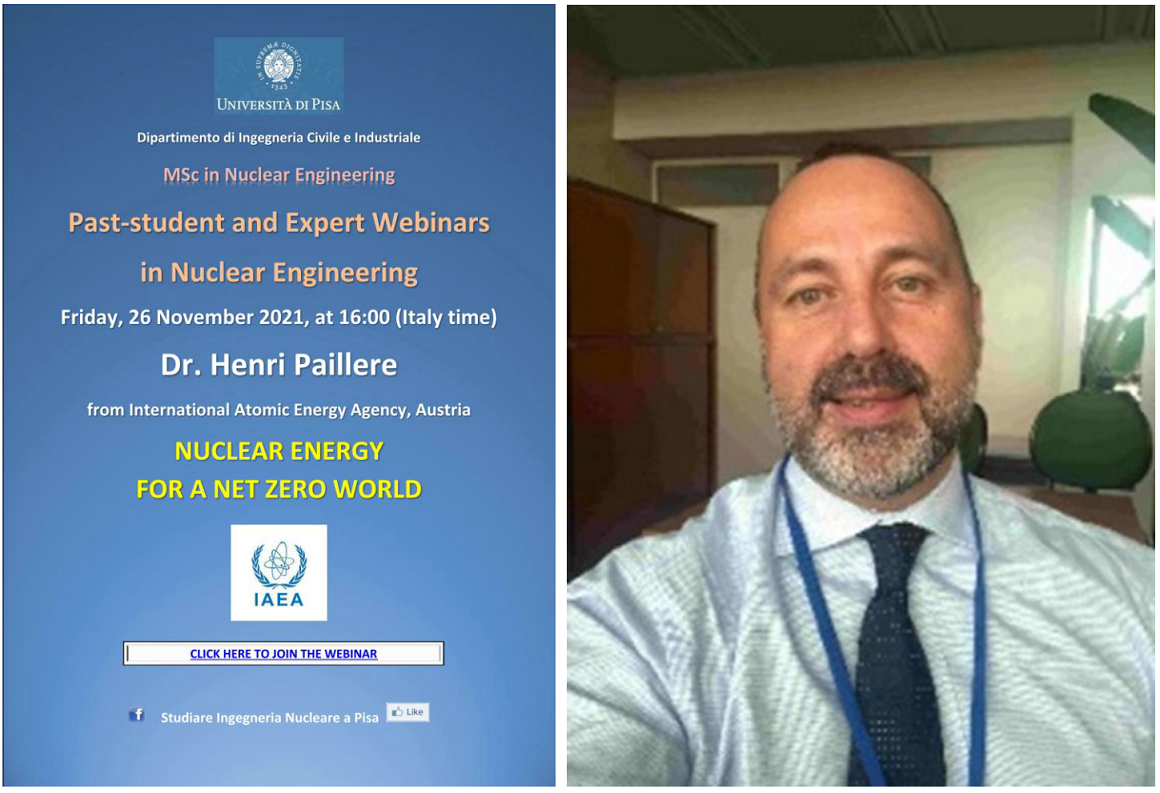
Henri PAILLERE, Head of Planning and Economic Studies Section, International Atomic Energy Agency. Dr. Henri PAILLERE has over 25 years of experience in the nuclear energy sector and is currently working as Head of the Planning and Economic Studies Section at the International Atomic Energy Agency which he joined in February 2020. Before that, Henri worked at the OECD Nuclear Energy Agency in Paris between 2011 and 2019, as Senior Analyst and Deputy Head of the Division of Nuclear Technology Development and Economics. He was also the head of the Technical Secretariat for two international initiatives, the Generation IV International Forum, and the International Framework for Nuclear Energy Cooperation. Prior to these positions, he worked as R&D Program Manager at the Alstom Power Company and at the French Alternative Energies and Atomic Energy Commission (CEA) in various positions, including European Programme Manager in the Nuclear Energy Division of CEA.
Webinar by Andrea Borio di Tigliole on Friday January 14, 2022 at 15:00
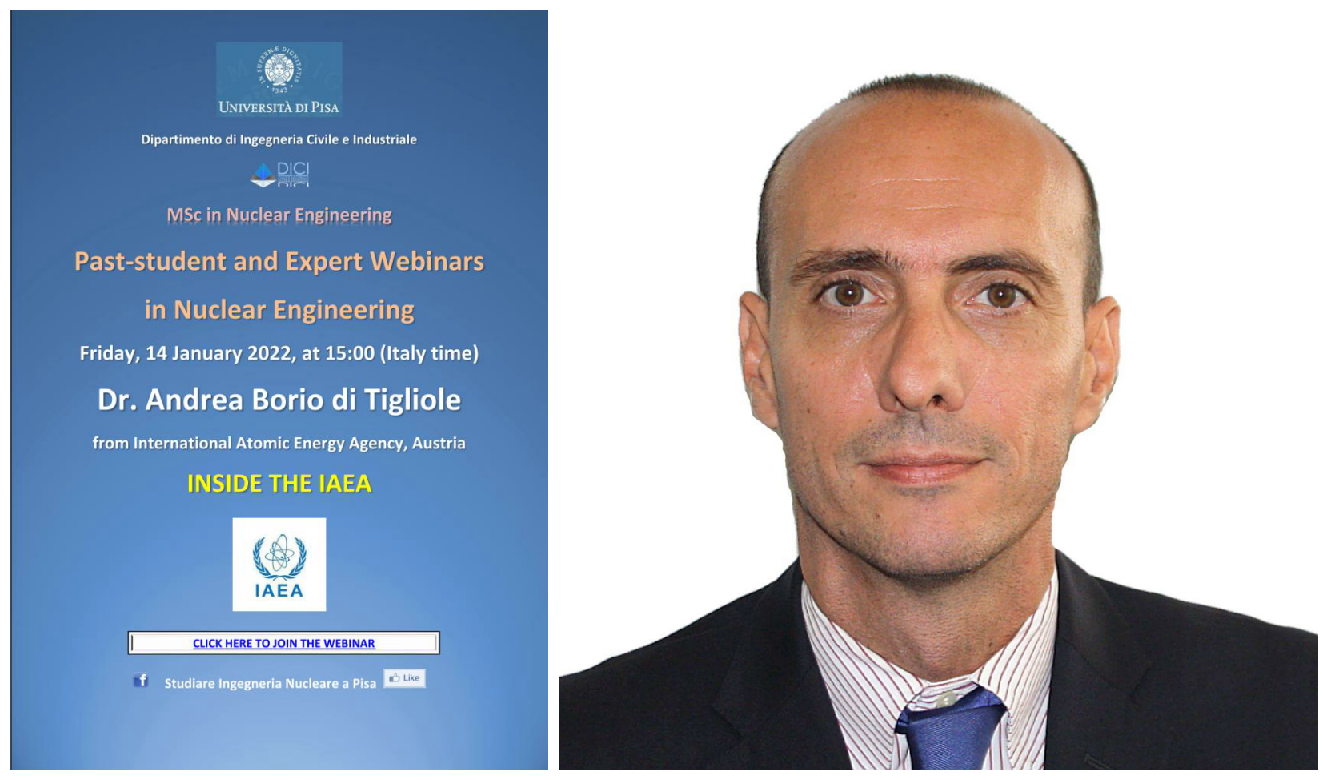
Mr Andrea BORIO DI TIGLIOLE, Ph.D | Programme Coordinator |
Department of Nuclear Energy |
International Atomic Energy Agency | Vienna International Centre, PO Box 100, 1400 Vienna, Austria |
Dr. Borio earned a MSc Degree in Nuclear Engineering at Polytechnic University of Milan in 1995. In 1999 he earned a Ph.D. in Science and Technology in Nuclear Power Plants at Polytechnic University of Milan.
From February 2002 to August 2012, he was the Director of the Inter-Departmental Nuclear Research Centre of the University of Pavia Laboratorio Energia Nucleare Applicata – LENA and Chief Technical Director of the TRIGA Mark II nuclear research reactor.
He was also Adjunct Professor of Experimental Nuclear Reactor Kinetics at Polytechnic University of Milan and Director of the post-graduated International Master on Nuclear and Ionizing Radiation Technologies of the University Institute of Advanced Studies of Pavia (IUSS).
Dr. Borio research activities were carried out in the fields of nuclear reactor physics and kinetics, nuclear measurements, nuclear fuel transmutation, operation of research reactors, and experimental physics. He is author/co-author of more than 90 publications on International Scientific Journals and on Conference Proceedings in the field of Nuclear Reactor Physics, Nuclear Measurements, Nuclear Physics and Experimental Physics.
Since September 2012 he is Staff-member of the International Atomic Energy Agency (IAEA), previously as Head of the Research Reactor Section and currently as Programme Coordinator in the Department of Nuclear Energy.
Webinar by Christian Schoenfelder on Friday January 21, 2022 at 15:00
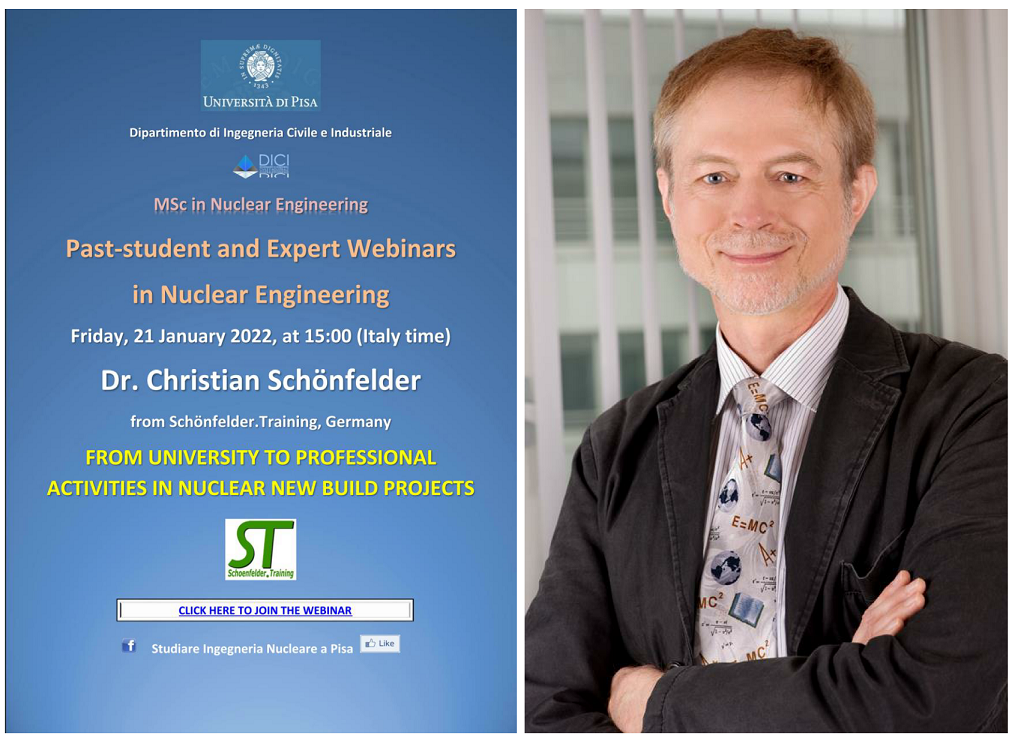
Christian Schönfelder, a theoretical physicist, has more than 25 years’ experience in training of nuclear engineers, nuclear power plant operators, and maintenance personnel, working in companies such as Siemens, Framatome, and AREVA. Amongst others, he has supported newly recruited engineers in developing their competences for an effective involvement in nuclear new build or modernization projects.
Based on these experiences, he recently developed and implemented a series of lectures to introduce nuclear (fusion) engineering master students to the reality in current (fission or fusion) new build projects: design (engineering) workflow and related tools, the impact of nuclear regulation respectively related codes and standards, illustrated by examples taken from ongoing fission (EPR) and fusion (ITER) projects.
Currently, as a Senior Training Consultant, he is a Member of the Management Board of the Fusion Industry Innovation Forum, responsible for Skills Development.
Webinar by Igor Pioro on Friday January 28, 2022 at 15:00
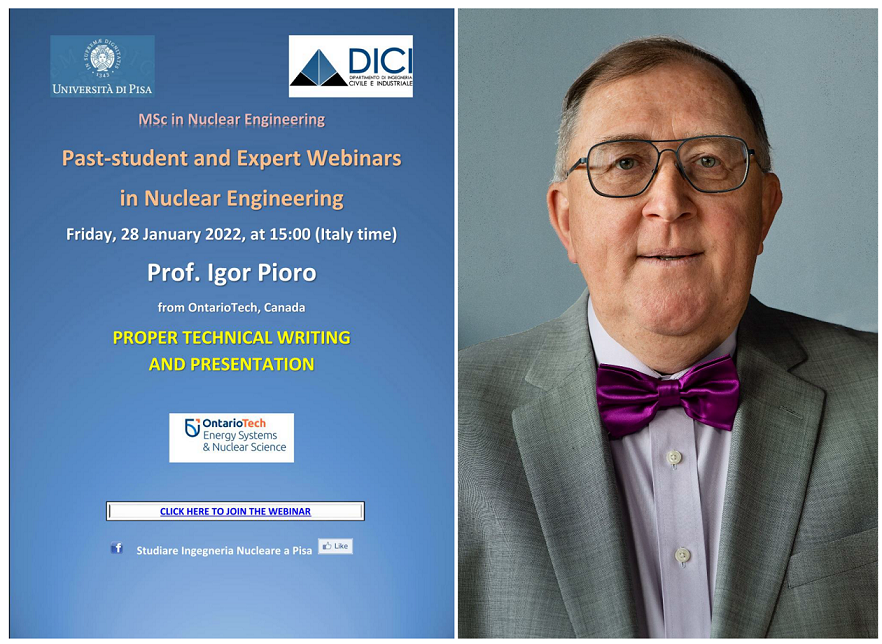
Professor Igor Pioro – Ph.D. (1983); Doctor of Technical Sciences (1992); Professional Engineer (Ontario, Canada) (2008); Fellow of the American Society of Mechanical Engineers (ASME) (2012), Canadian Society of Mechanical Engineers (CSME) (2015), and Engineering Institute of Canada (EIC) (2013); member of the American Nuclear Society (ANS) (2004) and Canadian NS (CNS) (2010); is an internationally recognized scientist within the areas of nuclear engineering (thermalhydraulics of nuclear reactors, Generation-IV nuclear-reactor concepts, etc.) and thermal sciences / engineering (boiling, forced convection including supercritical pressures, etc.) (https://nuclear.ontariotechu.ca/people/faculty/dr-igor-pioro.php).
He is author/co-author of more than 500 publications ‑ 12 technical books, 32 chapters in encyclopedias, handbooks and books, 99 papers in refereed journals, 286 papers in refereed proceedings of international and national conferences / symposiums, 26 patents and inventions, and 47 major technical reports.
Dr. Pioro has supervised / co-supervised 3 Ph.D., 17 M.A.Sc., 4 M.Eng. students with projects, 75 design-group students and 22 summer students, who have completed their studies successfully.
Dr. Pioro has graduated from the National Technical University of Ukraine "Kiev Polytechnic Institute" with M.A.Sc. in Thermal Physics in 1979. After that, he worked on various positions including an engineer, senior scientist, deputy director, professor, director of a graduate program in nuclear engineering, and associate dean. Currently, he is associated with the Faculty of Energy Systems and Nuclear Science, University of Ontario Institute of Technology (Oshawa, Ontario, Canada).
Dr. Pioro is a FoundingEditor – Editor-in-Chief of the ASME Journal of Nuclear Engineering and Radiation Science. He was a Chair of the Executive Committee of the Nuclear Engineering Division (NED) of the ASME (2011-2012) and a Chair of the International Conference On Nuclear Engineering (ICONE-20) (2011-2012).
Professor Pioro has received many international and national awards and certificates of appreciation including Harold A. Smith Outstanding Contribution Award from CNS (2017), Medal 60th Anniversary of NED (ASME) (2016); Service Recognition Award from the ASME (2014); Honorary Doctor’s Degree from National Technical University of Ukraine “Kiev Polytechnic Institute” (2013); The CNS Education and Communication Award (2011); UOIT Research Excellence Award (2011); ICONE Award from ASME (2009); etc.
Webinar by Lorenzo Stefanini on Friday February 4, 2022 at 15:00
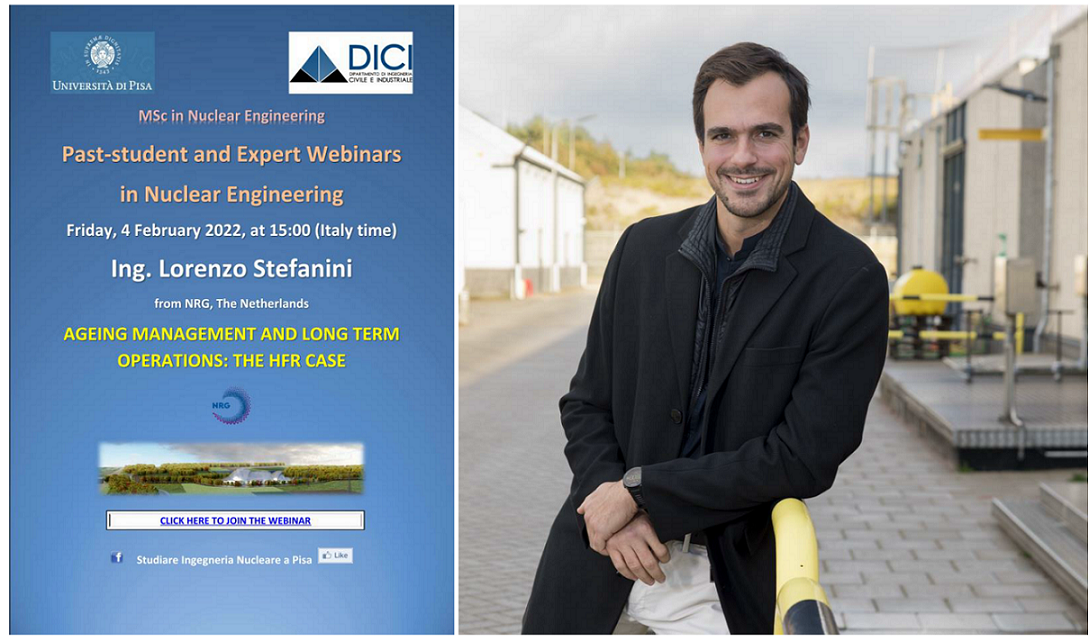
Lorenzo Stefanini earned a diploma in Chemistry in High School in 2009. His passion for excellence drove him to enrol in the exclusive course of Nuclear Engineering at the University of Pisa. There, he obtained a bachelor (2013) and a master (2015) degree. Thanks to his thesis work on structural material at SCK-CEN (Belgium) he earned also the European Master of Science in Nuclear Engineering (2016).
After a short experience at the Joint Research Center of the European Commission he began working at NRG (the Netherlands).
At NRG he specialized in Long Term Operation and Ageing Management offering support as a consultant to NPPs as Olkiluoto 3 (Finland) and Atucha I (Argentina).
As a Project Manager, he successfully brought to completion the life extension project for NRG’s isotopes production reactor: the High Flux Reactor (HFR). From 2020 Lorenzo is the Ageing Management Coordinator at HFR. In 2021 he takes over the role of Maintenance Manager at HFR. Lorenzo currently leads a 30 people strong team through the many challenges that the maintenance of a 60 years old reactor presents.
Webinar by Mitica Dragusin on Friday February 18, 2022 at 15:00
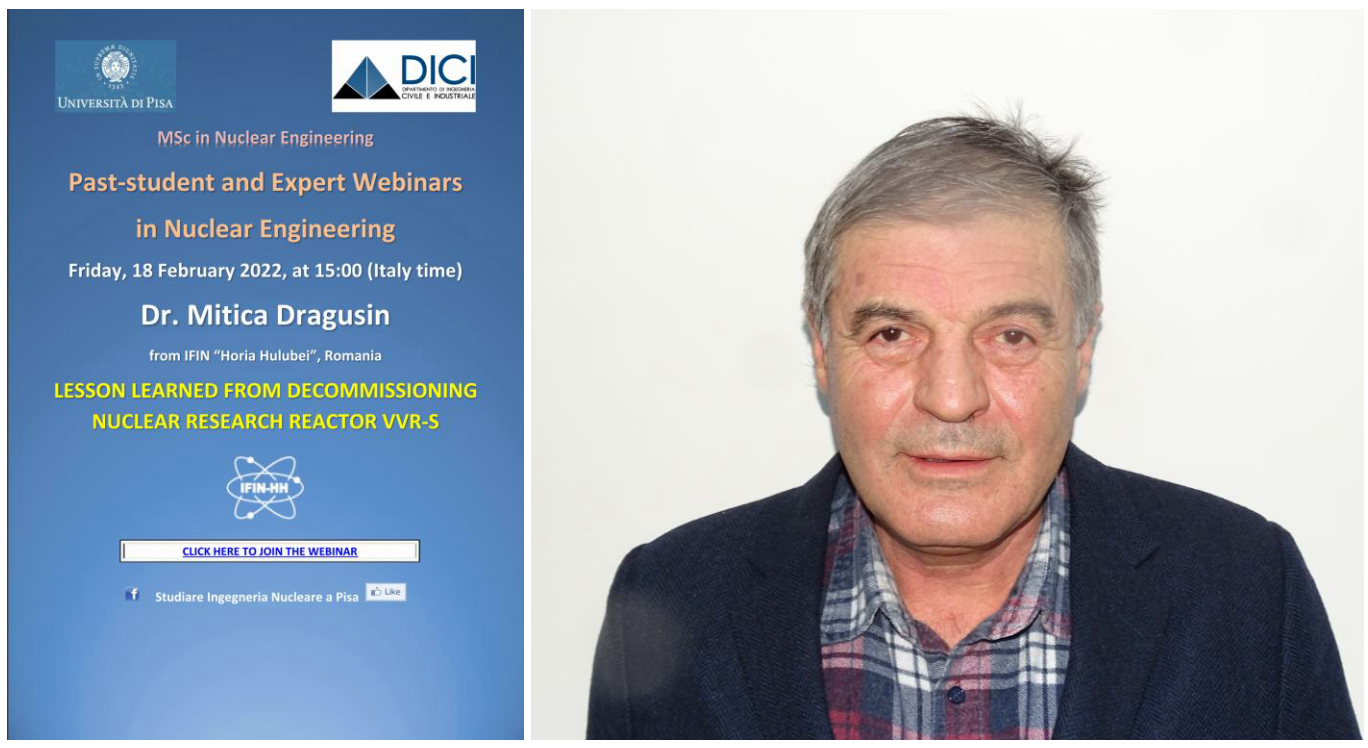
Dr. Mitica Dragusin, Senior Scientific Researcher, Horia Hulubei National Institute for Research and Development in Physics and Nuclear Engineering, IFIN-HH, Magurele, Romania.
- He obtained in 1995 his PhD in Nuclear Physics at the Atomic Physics Institute-IFA- Romania.
- He has more than 19 years of experience in Decommissioning Nuclear Facilities and Radioactive Waste Management resulted from decommissioning, and 19 years in R&D and water soluble polymers obtained by radiation processing with high activity radiation sources Co-60, so 38 years in the same National Institute for Physics and Nuclear Engineering- Horia Hulubei-IFIN-HH, in nuclear field.
- His present position in Institute is Nuclear Safety Director, from 2006 and from 2002 was project manager for decommissioning the Nuclear Research Reactor VVR-S, IFIN-HH, Magurele-Romania. Also was involved for repatriation the all spent fuel resulted from operational period of the Reactor to the Russian Federation, 1 air shipment on 2009, and other 3 air shipments on 2012.
- During 2010-2020, managed the decommissioning the VVR-S research reactor, with implementation the immediate dismantling strategy , and from July 2020 obtained the Certificate from Romanian Nuclear Regulatory Body the termination the decommissioning project, with free release of the building and land that will be reused also in the nuclear field for other applications.
Webinar by Ahmed Bentaib on Friday February 25, 2022 at 15:00
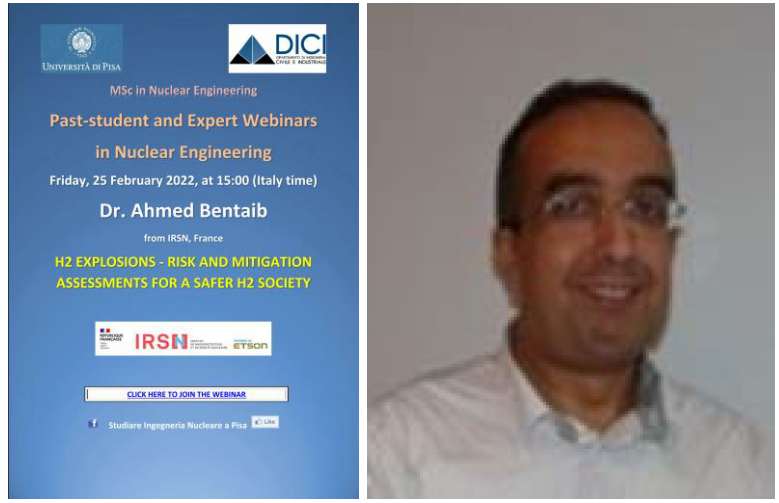
Ahmed BENTAIB is an expert on nuclear safety in IRSN since 2000. He received his Ph.D. from Lyon University in 1993 and the Accreditation Diploma to Supervise Research (HDR), from the University of Orléans in 2020.
His research interests cover Severe Accidents, modeling of hydrogen dispersion, mitigation and combustion phenomena pertinent to safety of nuclear and industrial facilities. As a result of his research, he is published more than 100 papers in refereed journal and international conferences.
During his career, Ahmed BENTAIB has contributed to several national, European, OECD and IAEA projects. After more than 20 years of professional career, he is Co-Chair of the OECD-NEA Working Group on Analysis and Management of Accidents (WGAMA) and co-leader of the Technical Area 2 on Severe Accidents of NUGENIA.
Along his career, Ahmed BENTAIB has collaborated in universities, and presently he is lecturer in masters’ courses related to nuclear safety.
Webinar by Maria Betti on Friday March 4, 2022 at 15:00
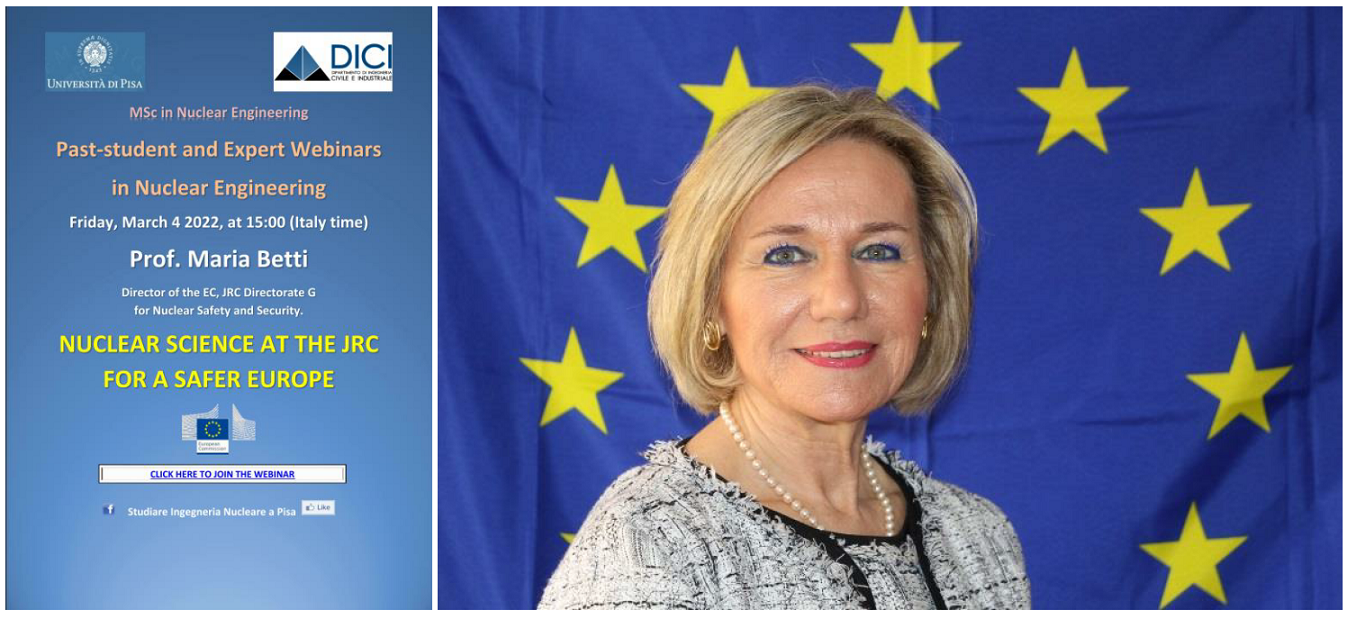
Maria Betti has a doctoral degree in chemistry with a specialisation in environmental, instrumental and radiochemistry.
Before joining the EC in 1991 she has served the Italian National Research Council and the department of Chemistry and Industrial Chemistry of the University of Pisa, Italy where she has continued to lecture until 2012.
She has been at the University of Lund (Sweden) and at the George Mason University (USA, Washington DC) as associated researcher. As of 1 March 1991 she joined the EC at the DG JRC-ITU.
From August 2008 to September 2012 she was director of the NAEL Division of the IAEA. As of 1 October 2012 she was director of the Institute for Environment and Sustainability located in Ispra (Italy).
As of 16 April 2015 she is Director of the EC Joint Research Centre Institute for Transuranium Elements. After the reorganisation of the JRC and the allocation of all nuclear activities under a unique directorate - spread across four different geographical sites - as 1st July 2016 she has been appointed Director G Nuclear Safety and Security and Director of the JRC Karlsruhe site.
In 2012 she was the international winner of the "Prix Monte-Carlo Femme de l'Année" for the establishment after the RIO+20 summit of the International Centre on Ocean Acidification at the IAEA office in the Principality of Monaco. From 2004 to 2008 she chaired the JRC Women and Science Network.
In November 2016 Maria Betti has been honoured with the magnificent distinction by the Ordre de Saint Charles (Principality of Monaco).
Webinar by Lorenzo Basili on Friday March 11, 2022 at 15:00
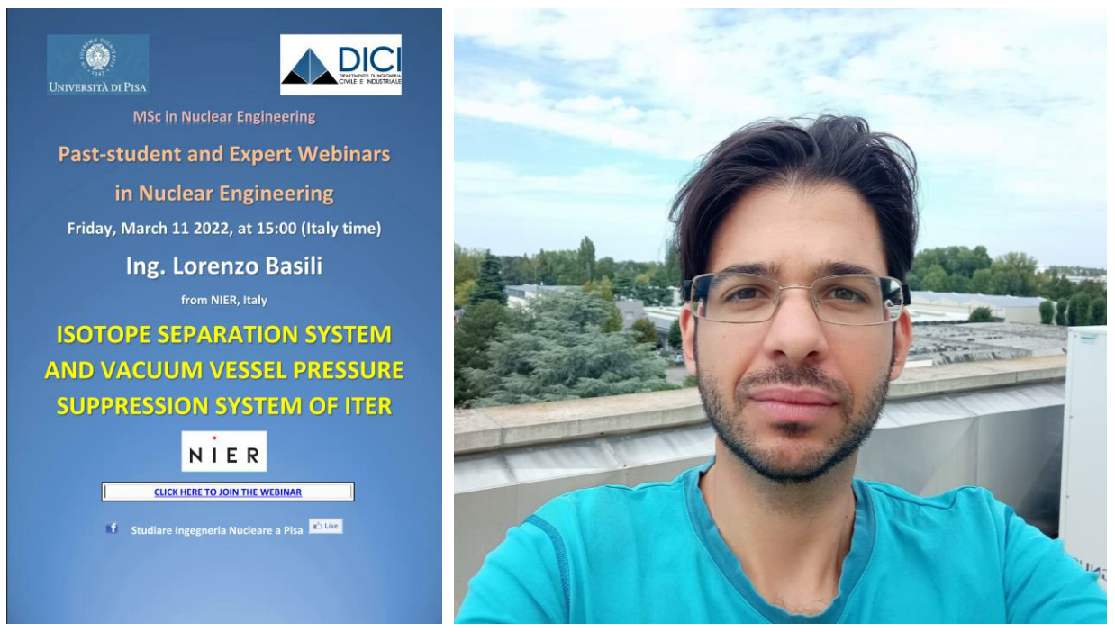
Lorenzo Basili earned a bachelor (2014) and a master (2017) degree in nuclear engineering at University of Pisa.
He spent 6 months at ITER site (France) for the master thesis, working at the Vacuum Vessel Suppression System, focusing on FEM and CFD analysis of the main components of the system. Then, he remained in Cadarache for a 3 years PhD (now waiting for the reviews of the submitted thesis), developing a connection between a thermodynamic code (EcosimPro) with an updated specific library for tritium (Multiflash) to be used in the design of the Isotope Separation System of the tritium plant of ITER.
Since 2020 he is system engineer at NIER Ingegneria S.p.A. He is involved mostly on thermohydraulic analysis related to contracts with ITER and F4E (especially Electron Cyclotron Upper Launcher and the Water Cooled Lead-Lithium test blanket module).
Webinar by Mariano Tarantino on Friday March 18, 2022 at 15:00
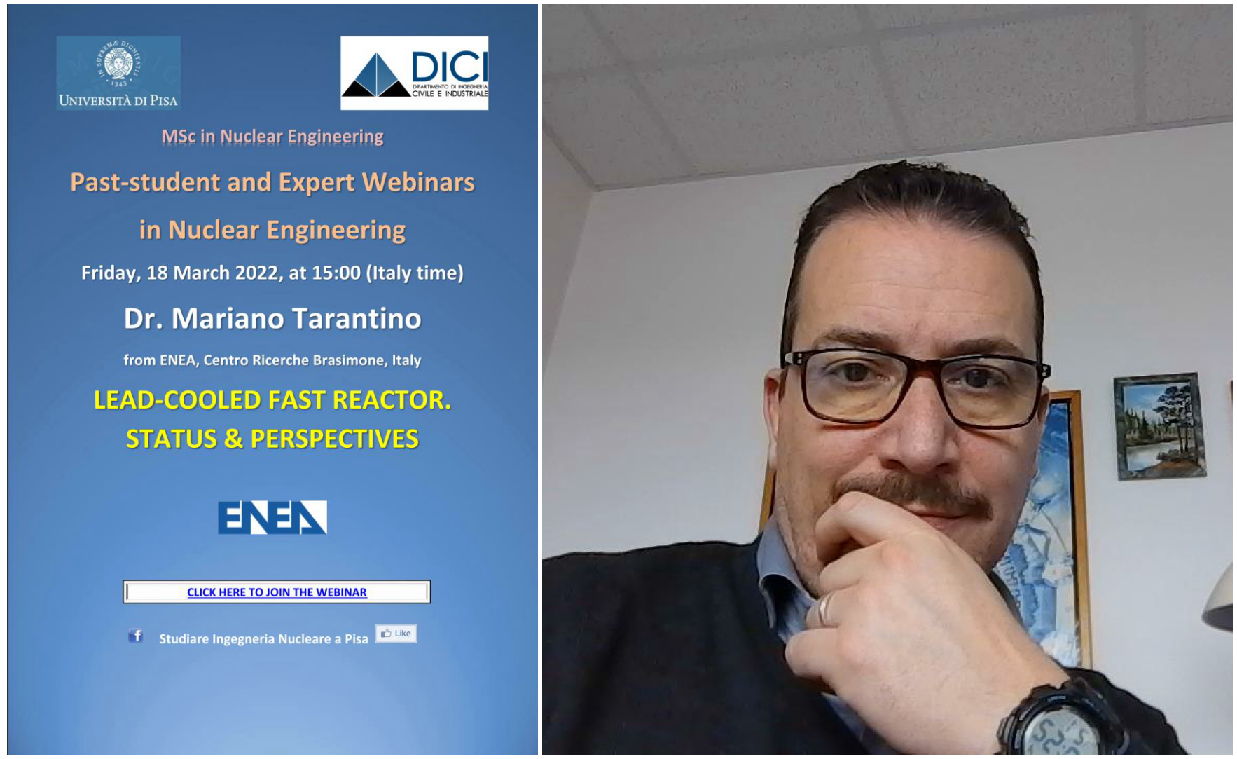
Dr. Mariano Tarantino, ENEA.Mariano Tarantino got is PhD degree in “Industrial and Nuclear Safety Course” of the “Leonardo da Vinci” Doctoral Engineering School in 2008, discussing a thesis work on “Experimental Investigation of the Thermal Hydraulic Behaviour of Heavy Liquid Metal Cooled Reactors”.
From November 2010 to December 2018 he acted as Scientific Advisor of Gen. IV R&D domain in the frame of the Research Program Agreement (ADP) between ENEA and Italian Minister for the Economic Development (MiSE).
Mariano Tarantino has been involved in heavy liquid metal technology development since 2003, leading numerous programs at national and international level. In this frame, he worked on heavy liquid metal heat transfer, prototypical components design, operation and experimental characterization of innovative solutions for LFRs, experimental infrastructures implementation, coolant chemistry assessment and material development and qualification.
Mariano Tarantino is also a member of the FALCON Consortium for the ALFRED (DEMO LFR) promotion, design, construction and operation in Romania. Specifically, he is responsible of the RD& Qualification Task Force in FALCON.
He is author of more than 50 papers in international journals and more than 80 papers in peer-reviewed international conferences.
Presently he is the head of Innovative Projects Section in the Department of Fusion and Technologies for Nuclear Safety and Security, ENEA.
Webinar by Alessandro Marino on Friday March 25, 2022 at 15:00
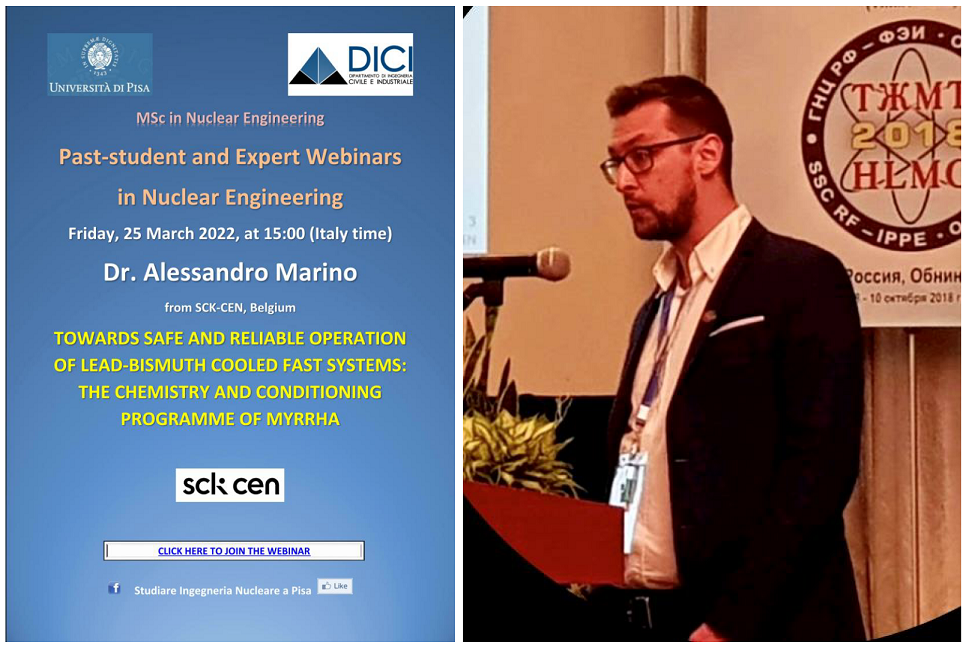
Alessandro Marino received his Master Degree in Energy Engineering at the University of Pisa in 2011 and obtained his PhD (cum laude) in 2015 from the Vrije Universiteit of Brussel, in collaboration with the Belgian Nuclear Research Centre (SCK CEN). His PhD work was mainly focused on numerical modelling of coolant chemistry-related R&D for MYRRHA reactor, including experimental validation. During this period he was also visiting researcher at Los Alamos National Laboratory, USA, to perform experiments at the lead material test loop DELTA.
Since 2015 he is research engineer in the Chemistry and Conditioning unit (CCP) at SCK•CEN. He is responsible of design and construction of experimental rigs to the study heavy liquid metal coolant chemistry and its complex interactions with thermal hydraulics. He also continued his numerical activities, recently focused on multi-physics simulations and tool development.
He is author and co-author of more than 20 peer reviewed articles in international journals and active internationally in the field of LBE coolant chemistry, with leadership roles in European projects. In 2021 he was guest editor for the TMS journal and since that year he is also representing SCK CEN in the International Board of the International Workshop on Spallation Materials Technology (IWSMT).
Webinar by Anis Bousbia Salah on Friday April 1, 2022 at 15:00
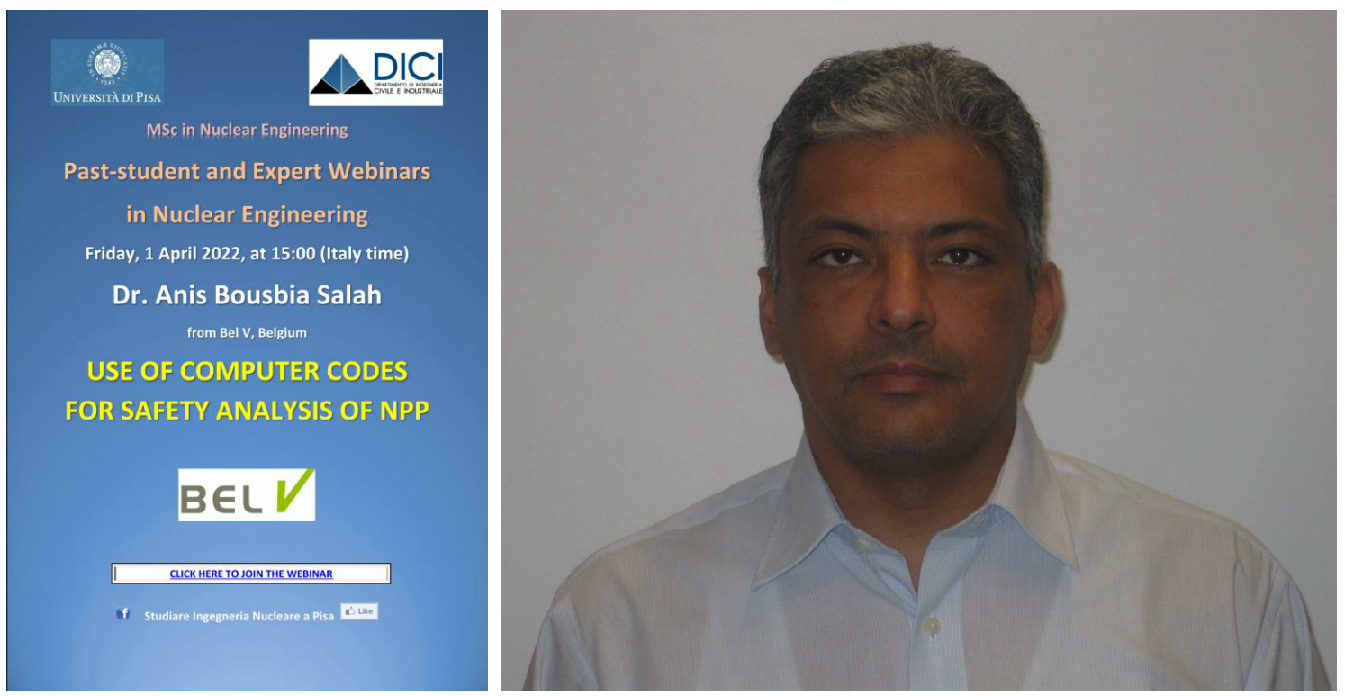
Dr. Anis BOUSBIA SALAH got his PhD degree in Nuclear Engineering and Industrial Safety from University of Pisa (Italy) in 2004. The thesis was about the use of coupled thermal-hydraulic system and 3D neutron kinetics codes in simulating transients in BWR type reactors. From 2004 to 2007, he worked as a post-doc researcher at the department of Nuclear Engineering of the University of Pisa. In 2006-2007, he worked as a researcher at the Helmholtz-Zentrum Dresden-Rossendorf research center (Germany). His main task was about the use of German coupled thermal-hydraulic system and 3D neutron kinetics codes and uncertainties methodologies for VVER type reactors.
Since 2008, he is working at Bel V (the Belgian technical safety organisation of the federal agency of nuclear control) in Belgium. His main activities concern Nuclear Safety Analysis in the frame of nuclear power licencing and operation of the Belgian PWR units. He actively participated in several international joint EU projects, OECD/NEA working groups’ and experimental thermal-hydraulic projects. He is the author of more than hundred papers published in International Journals and conferences.
Webinar by Danilo Ferretto on Friday April 8, 2022 at 15:00
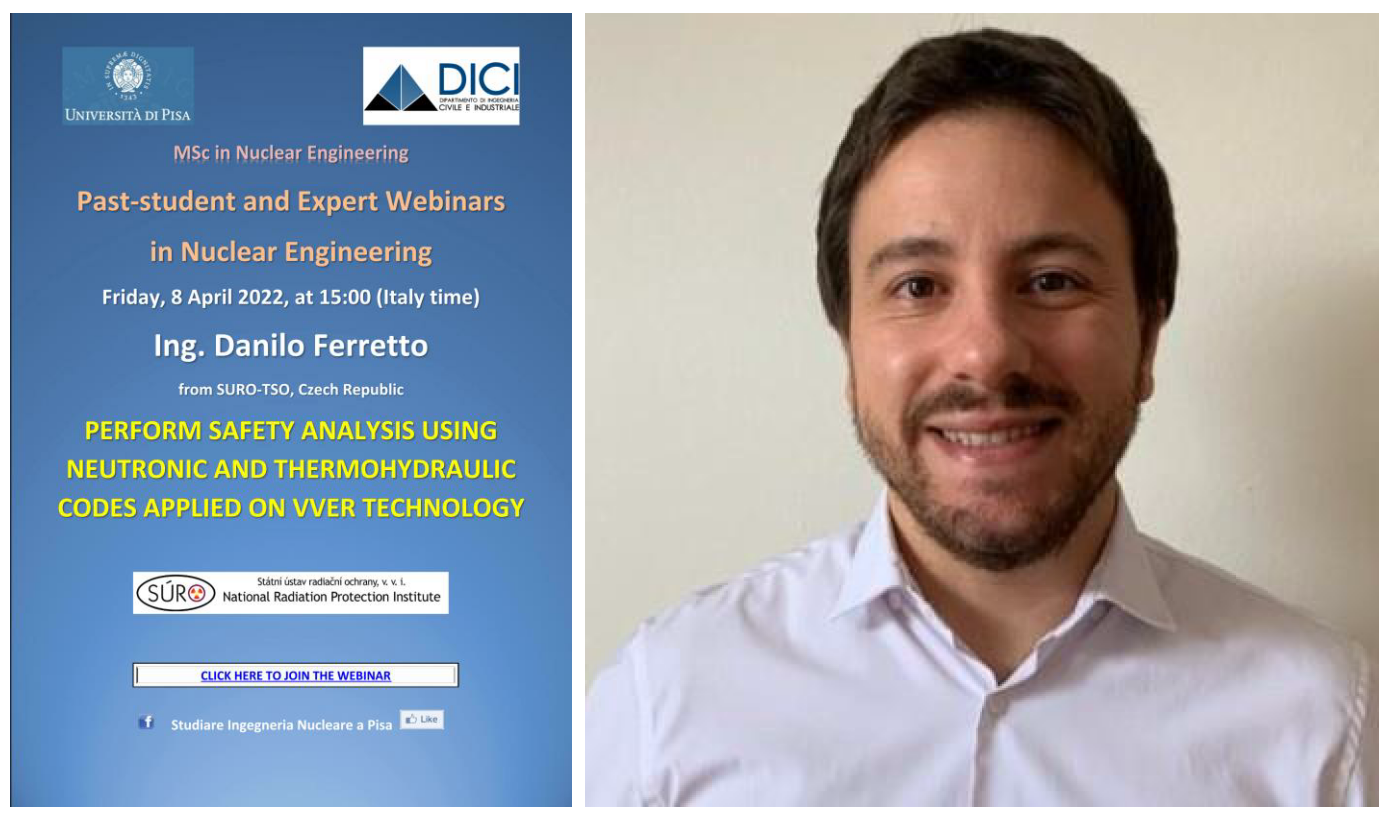
Danilo Ferretto was born in Catanzaro, Italy in date 07/03/1991. He is a Nuclear Safety Engineer and Technical Support Officer for the National Radiation Protection Institute (SURO) in the Czech Republic since 2019 and currently is involved with Research Centre Rez (CVR) on research on Small Modular Reactors.
He has a Master’s degree in Nuclear Engineering from the University of Pisa (2019). He has completed the certification for Fire Safety Engineer at the University of Pisa (2018). He has a degree in nuclear and industrial safety engineering at the University of Pisa (2016). Due to the Master thesis performed in the Czech Republic, he was awarded with the European Master of Science in Nuclear Engineering EMSNE certification in 2020.
His research interests are focused on nuclear safety, from the development of Probabilistic Safety Assessments to the nuclear Thermohydraulics and core neutronic using codes as CAFTA, Risk Monitor, TRACE, ANDREA HELIOS.
Webinar by Maarten Ooms on Friday April 22, 2022 at 15:00
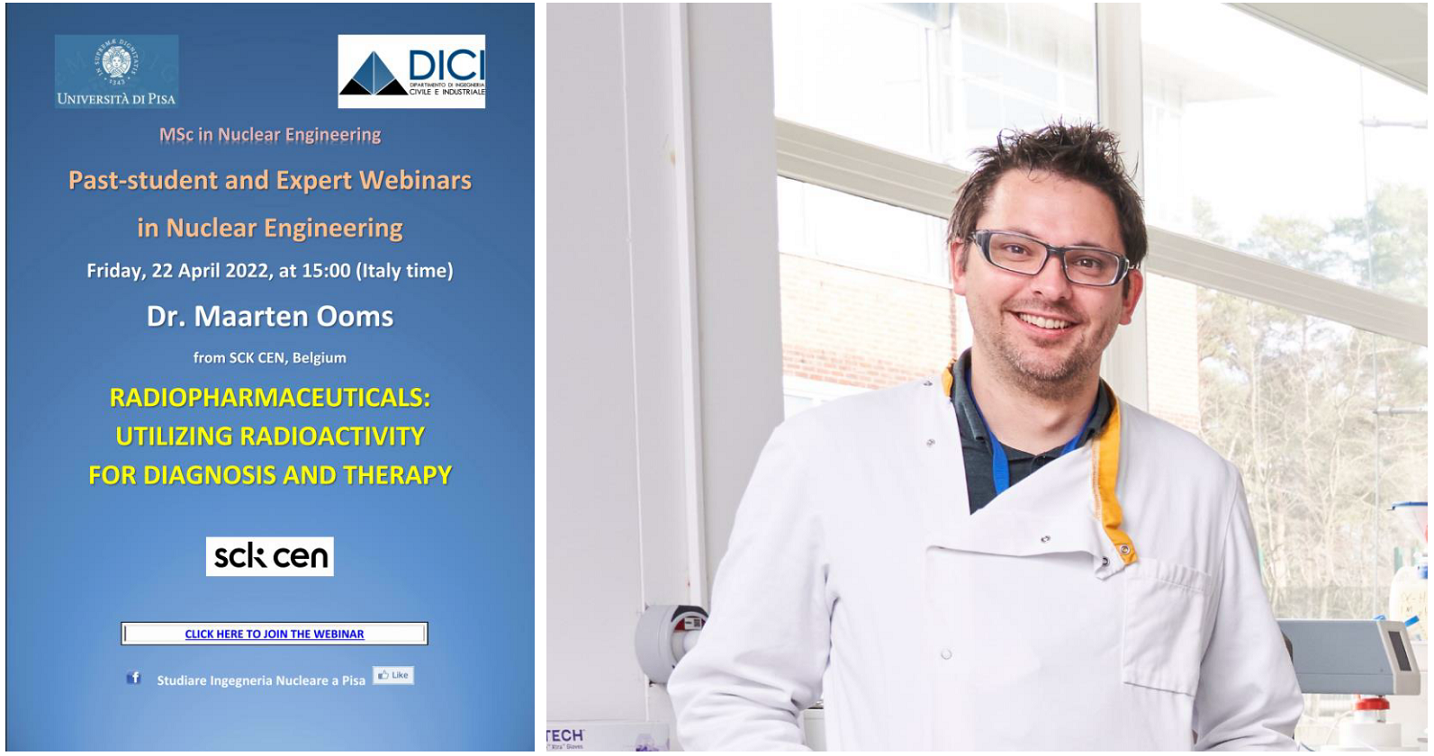
Maarten Ooms is working at the Belgian nuclear research center (SCK CEN) where he is managing a research program focusing on radiopharmaceutical development. He obtained his PhD in pharmaceutical sciences from the KU Leuven for his work on the development of PET radiopharmaceuticals. Maarten spent 2 years in the US working as a post-doctoral research fellow at the molecular imaging branch of the National Institutes of Mental health (Bethesda, MD). Since joining SCK CEN in 2017, he been working on a research program focusing on the development of innovative medical isotopes and radiopharmaceuticals for targeted radionuclide therapy.
Webinar by Neil E. Todreas on Friday April 29, 2022 at 15:00
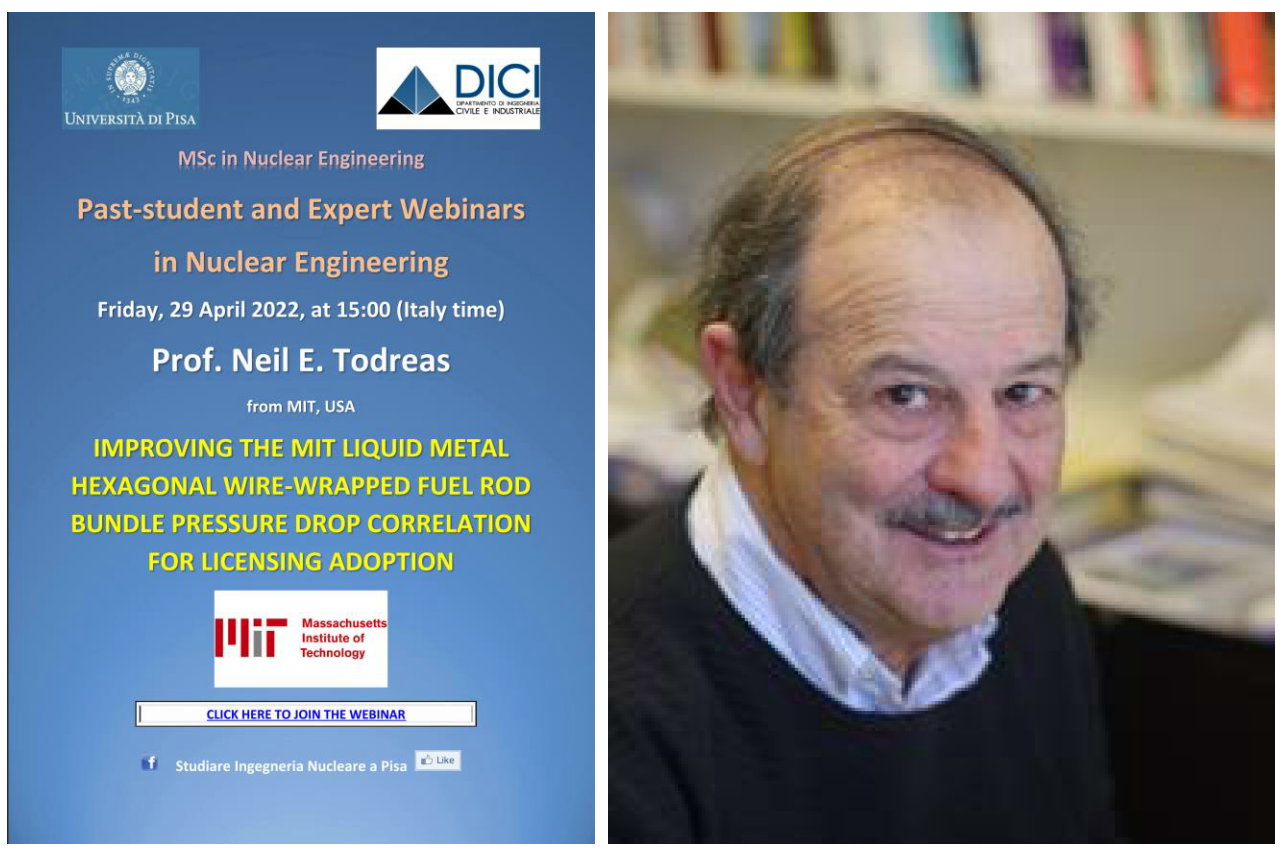
Prof. Neil E. Todreas
KEPCO Professor of Nuclear Science and Engineering, and Professor of Mechanical Engineering (Emeritus)
617-253-5296
617-258-8863 (fax)
Building 24- Room 216A
Education
B.S., Mechanical Engineering, Cornell University, 1957
S.M., Mechanical Engineering,Cornell University, 1958
Sc.D., Nuclear Engineering, Massachusetts Institute of Technology, 1966
Research Interests
Thermal hydraulic aspects of nuclear systems performance under steady-state and accident conditions, advanced light water reactor (LWR) and fast reactor concepts, and safety features of operating LWRs of western design. Means to achieve physical protection of these reactors is also of interest
Honors and Awards
Outstanding Professor Award, Nuclear Science and Engineering Department: 1975, 1976, 1980, 1996, 2011American Nuclear Society Best Paper Award, Thermal-Hydraulic Division, and National Heat Transfer Conference Best Paper Award, both 1987
American Nuclear Society Technical Achievement Award, Thermal-Hydraulic Division, 1994MIT School of Engineering Ruth & Joel Spira Award for Distinguished Teaching, 1995American Nuclear Society Arthur Holly Compton Award, 1995ICONE 8 Conference, Thermal Hydraulic Track Best Paper Award, 1999 Inaugural Lecture, Distinguished Lecture Series of the Department of Mechanical & Nuclear Engineering, Pennsylvania State University, 2001Inaugural Lecture, O'Hanian Engineering Lecture Series,of the Department of Nuclear Engineering, University of Florida, 2002Henry DeWolf Smyth Nuclear Statesman Award, 2005Inaugural Lecture, Distinguished Lecture Series of the Department of Nuclear and Quantum Engineering, Korean Advanced Institute of Science and Technology, 2014
Other Professional Achievements
Fellow, American Nuclear Society, 1981Fellow, American Society of Mechanical Engineers, 1983Member, National Academy of Engineering, 1988Chair, Korea Electric Power Corp. Professor of Nuclear Engineering, 1992-2006
Books
N. E. Todreas and M. S. Kazimi, "Nuclear Systems Volume I: Thermal Hydraulic Fundamentals, 3rd ed," CRC Press, 2021; Volume II: Elements of Thermal Hydraulic Design, 2nd ed,2022.
M. Gavrilas, P. Hejzlar, Y. Shatilla, and N. E. Todreas, "Safety Features of Operating Light Water Reactors of Western Design," CRC Press, 2011.
Webinar by Alessandro Del Nevo on Friday May 6, 2022 at 15:00
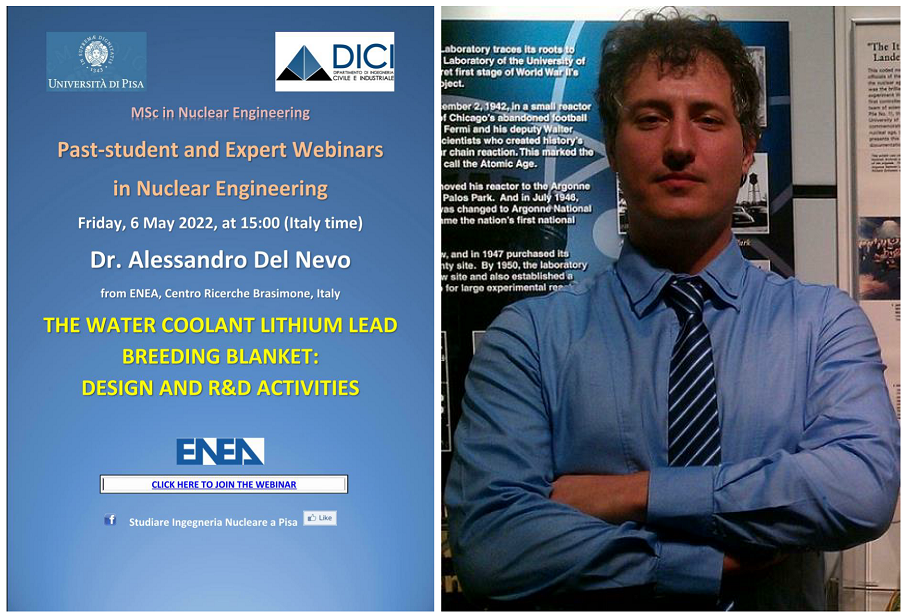
Alessandro DEL NEVO. Nuclear Engineer (2002) and PhD in Nuclear Safety (2007) at University of Pisa. He worked for the San Piero a Grado Nuclear Research Group (2003-2010) of University of Pisa and, then, for ENEA. . Currently, he is the Head of Systems and Components Design Laboratory at ENEA, Research Center Brasimone.
Technical skills: thermal-hydraulics, design of systems and components, design of experimental facilities and experiments, code model development and validation, fuel pin mechanics. Co-author of 98 publications in International Journals; 104 papers in peer-reviewed International Conferences; 8 contributions in published content books and International Technical Reports (e.g. IAEA, NEA); and more than 300 research reports.
Since 2013, he contributes to Nuclear Fusion Technology design and R&D activities through the participation in the EUROfusion Project: responsible of the heavy liquid metals/water safety issue (since 2013); leader of the WCLL Breeding Blanket design (2014-2020); scientific manager of the working package Balance of Plant (2014-2020); currently, deputy project leader and scientific manager of the working package Breeding Blanket.
Webinar by Carlo Parisi on Friday May 13, 2022 at 15:00
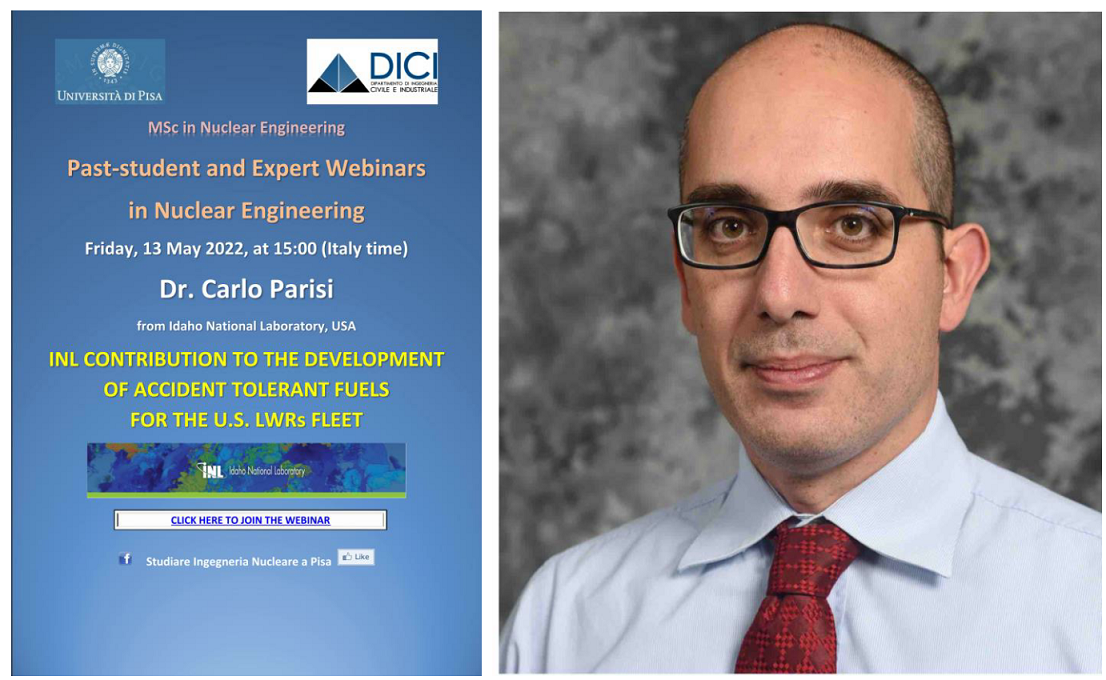
Dr. Carlo Parisi is a scientist with over 18 years of experience in academics and government laboratories. In 2004 he got a M.Sc. and in 2008 a Ph.D. in Nuclear Engineering at University of Pisa, Italy. His area of expertise includes thermal hydraulics, neutronics and uncertainty quantification. Since October 2015 he is a scientist at the Idaho National Laboratory, USA. He works on best-estimate plus uncertainty and risk-informed methods development for the US light water reactors fleet, and on the thermal-hydraulic designs of MARVEL microreactor and of ATR replacement. He is the technical lead of the INL RELAP5-3D system thermal hydraulic code. He is member of the American Nuclear Society since 2004.
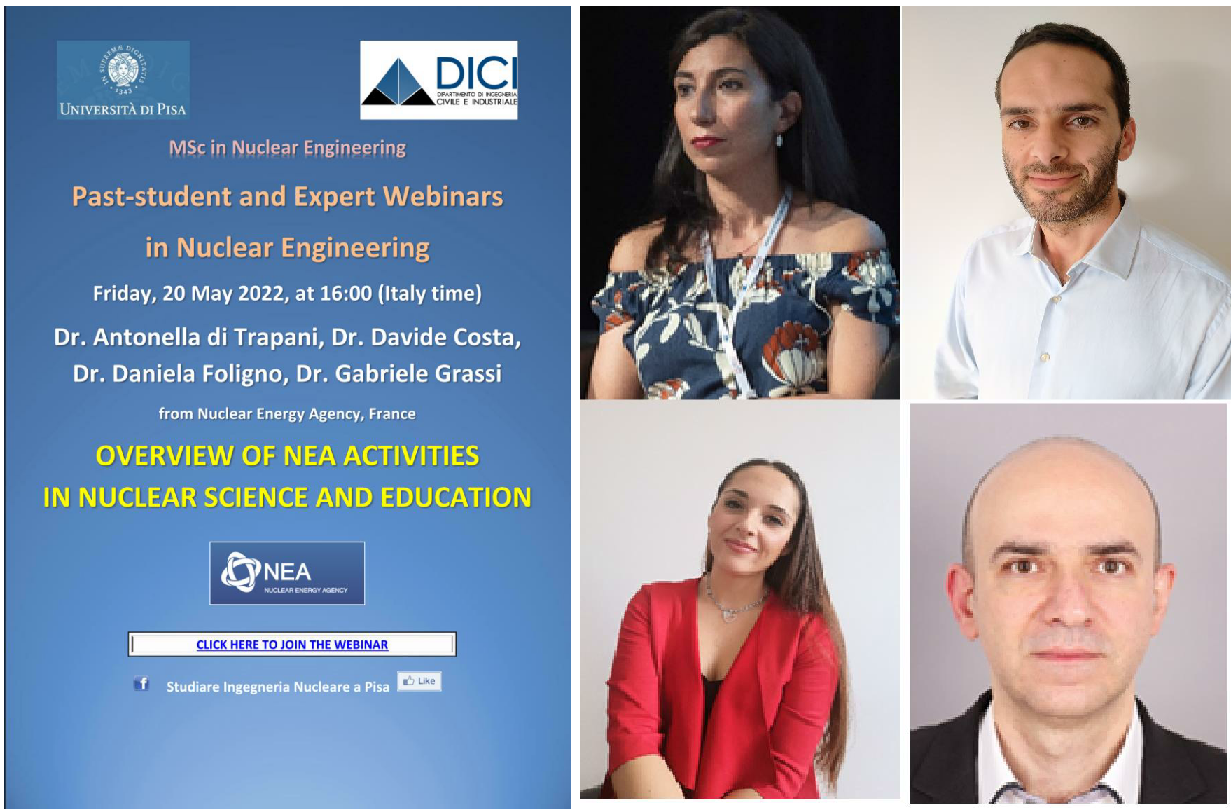
Dr Antonella di Trapani is Senior Analyst at the NEA where she is leading the Education, Training and Knowledge Management activities in particular the Nuclear Education, Skills and Technology (NEST) Framework and the Global Forum on Nuclear Education, Science, Technology and Policy. Before joining the NEA in July 2018, she was Team Leader for Science Policy Advice within the European Commission’s Scientific Advice Mechanism. Prior to that, she has held several positions as Programme Manager and Head of International Cooperation, at the G20 Wheat Initiative, European Commission European Research Council and European Science Foundation, managing large scale collaborative projects, capacity building networks and the largest grants in Europe. In addition, she also worked for the private sector as Research Scientist in Johnson Matthey Technology Centre. She was awarded two EC Marie Curie Fellowships to carry out her PhD and PostDoc, and she was Chair of the Marie Curie Fellows Association, the largest Fellows’ network in Europe. She also founded and chaired the Women in Science Working Group. She is also co-founder and former Vice-Chair of the Gender in Science for Mobile Scientists of the Marie Curie Alumni Association. Dr di Trapani is an Italian national and holds a MSc in Chemistry from the University of Palermo (Italy) during which she was awarded an Erasmus Fellowship at University College London (UK), a PhD in Chemistry and a PostGraduate Diploma in Quality Improvement from Trinity College Dublin (Ireland), a MSc in Science Communication and Journalism from University of Ferrara (Italy), and a PostGraduate Diploma in International Development from London School of Economics and Social Sciences (UK).
Dr Davide Costa joined the NEA in 2014, first within the NEA Data Bank, and since 2017, in the NEA Division of Nuclear Science.
At the NEA Data Bank, he worked on the Thermochemical Database (TDB) project, addressing the review, assessment and selection of high-quality thermochemical data of interest for the safety assessment of deep geological repositories for high-level radioactive waste. His duties included scientific support activities, as well as the design and development of a new electronic database for the collection and preservation of selected data. In the NEA Division of Nuclear Science, he is now responsible for nuclear materials-related activities, covering both structural materials and fuel materials. In this role, he serves as the Technical secretary of the NEA Working Party on Multiscale Modelling of Fuels and Structural Materials for Nuclear Systems (WPMM). Under the supervision of the NEA Nuclear Science Committee, he is also co-ordinating the creation of a new working party on nuclear materials with an expanded scope to go beyond nuclear materials modelling and address the experimental characterisation, data review, assessment and collection of fuel materials and structural materials.
Dr Costa co-ordinates two international joint projects: the Thermodynamics of Advanced Fuels – International Database (TAF-ID) project and the Thermodynamic Characterisation of Fuel Debris and Fission Products Based on Scenario Analysis of Severe Accident Progression at Fukushima Daiichi Nuclear Power Station (TCOFF) project. His is responsible for multilateral negotiations to build project membership, and supervises the project agreement and preparation of the programmes of work for these projects. Throughout implementation of the projects, he also oversees the co-ordination of expert activities, financial matters and procurement, and he supervises R&D contracts established within the projects.
Dr Costa was the Secretary of the Expert Group on Accident Tolerant Fuels (ATF) for Light Water Reactors (EGATFL) until the completion of its activities in 2019 and the publication of a state-of-the-art report addressing ATF performance in normal operation and accident conditions, and reviewing available data on the compatibility of different ATF fuels and cladding concepts.
Since 2021, he has been part of the Generation IV International Forum Technical secretariat team, working for the Task Force on Advanced Manufacturing and Materials Engineering. He is also contributing to the establishment of a task force on the non-electric application of nuclear heat, which aims to explore and illustrate opportunities, advantages and hurdles arising from potential combinations of GIF technologies with non-electric applications of nuclear heat.
Dr Costa has extensive experience in the nuclear energy sector at the international level. He worked in R&D at EDF for three years, contributing to the modelling of the thermal ageing of austenitic-ferritic steels used for the primary circuit of French PWRs. The activities he is involved in at the NEA span from nuclear materials and fuels modelling to thermodynamic modelling of fuel behaviour under normal operation and accident conditions. He is also extensively involved in post-Fukushima activities, particularly in the Fukushima-Daiichi accident progression evaluation from the materials science perspective (analysis of materials interactions occurring during the accident and their consequences on the accident progression and the source term).
An Italian national, he holds a PhD in nuclear materials modelling from Lille University, with a thesis on the “Modelling of the thermal evolution of Fe-Cr alloys using an atomistic kinetic Monte Carlo approach based on Density Functional Theory”. He graduated a theoretical physicist at the École Normale Supérieur de Lyon (France). Dr Costa is an enthusiastic and passionate team worker, always looking for opportunities to create connections among communities from contiguous nuclear research areas so as to deliver rich multi-dimensional outputs in support of member country decision-making processes.
Dr Daniela Foligno is a Junior Scientist at the NEA Data Bank, where she is responsible for the Joint European Fission and Fusion (JEFF) Project. Before joining the NEA in January 2020, she carried out her PhD at CEA Cadarache (France) on the “New evaluation of delayed-neutron data and associated covariances”. During her last year, she became president of the Association des thèsards de Cadarache (ASTHEC). In 2016, Dr Foligno received the European Master of Science in Nuclear Engineering (EMSNE) Certification. Prior to that, she was awarded a Felloship by the KIC InnoEnergy project to attend the European Master in Innovation of Nuclear Energy (EMINE) Master Program, one year at the Royal Institute of Technology in Sweden, and one year at the Institut national des sciences et technologies nucléaires in France. At the same time, she attended a summer school on Nuclear Nonproliferation, organized by the Nuclear Nonproliferation Education and Research Center (NEREC) in South Korea. Dr Foligno has a bachelor in Energy Engineering obtained at the Politecnico di Torino in Italy.
Dr Gabriele Grassi is a Nuclear Scientist at the OECD Nuclear Energy Agency (NEA) where he co-ordinates and supports work on scientific issues related to advanced nuclear fuel cycles, including fuel cycle scenarios, innovative fuels and materials, separation chemistry, waste disposal and coolant technologies.
He has extensive experience in nuclear energy, spanning a wide range of technical areas and different roles in engineering, R&D and innovation. Prior to joining the NEA, he worked at Orano as R&D Manager for the back end of the nuclear fuel cycle. He co-ordinated cross-cutting and multi-disciplinary activities in support of used fuel reprocessing, plutonium recycling and waste management, in continual interaction with experts from industry and research bodies, as well as from business, legal and strategy teams. He was then involved in exploring innovative solutions for the nuclear fuel cycle, focusing on advanced nuclear systems as well as advanced options for fuel reprocessing. Previously, he worked at Framatome as a core design engineer and a technical leader for light water reactor projects.
He completed his PhD at the French Alternative Energies and Atomic Energy Commission (CEA) in neutronics and applied mathematics. He also holds a MSc in nuclear engineering from Politecnico di Torino (Italy) and a MSc in energy systems, with a specialisation in reactor physics, from the Université d’Evry Val d’Essonne/National Institute for Nuclear Science and Technology (INSTN, France).
Webinar by Matteo Bucci on Friday May 27, 2022 at 15:00
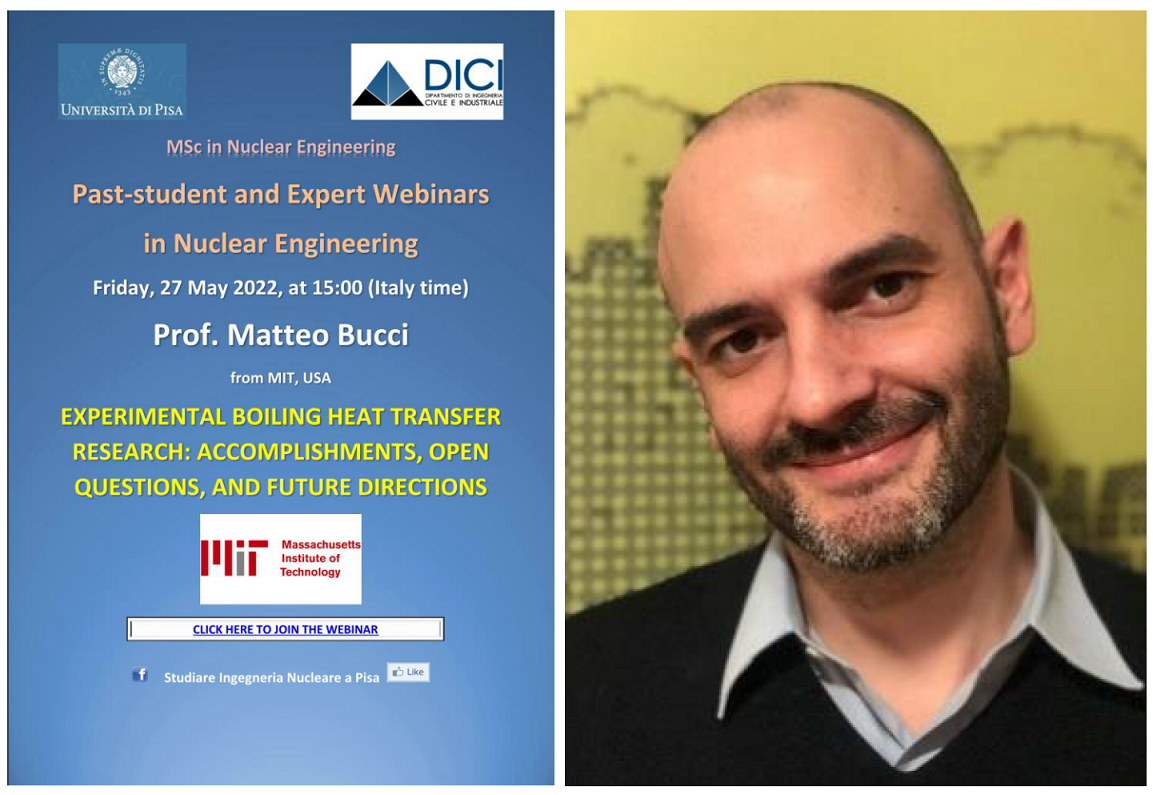
Dr. Matteo Bucci is Associate Professor of Nuclear Science and Engineering at MIT. He has joined the MIT faculty in 2016, where he teaches undergraduate and graduate courses in nuclear reactor engineering and design, and two-phase heat transfer. His thermal-hydraulics group at MIT focuses on two major research axes related to nuclear reactor safety and design: (1) New understanding of heat transfer mechanisms in nuclear reactors, (2) Engineered surfaces and coatings to enhance two-phase heat transfer. His group also develops and uses advanced diagnostics, such as high-speed infrared thermometry, and post-processing algorithms to perform unique heat transfer experiments. Matteo has published over 40 articles in the areas of two-phase flow and heat transfer, and surface engineering technology. For his research work and his teaching, he won several awards, among which the MIT Ruth and Joel Spira Award for Excellence in Teaching (2020), ANS/PAI Outstanding Faculty Award (2018), the UIT-Fluent Award (2006), the European Nuclear Education Network Award (2010), and the 2012 ANS Thermal-Hydraulics Division Best Paper Award (2012). Matteo is Editor of Applied Thermal Engineering and a consultant for the nuclear industry.
Webinar by Martina Adorni on Friday June 3, 2022 at 15:00
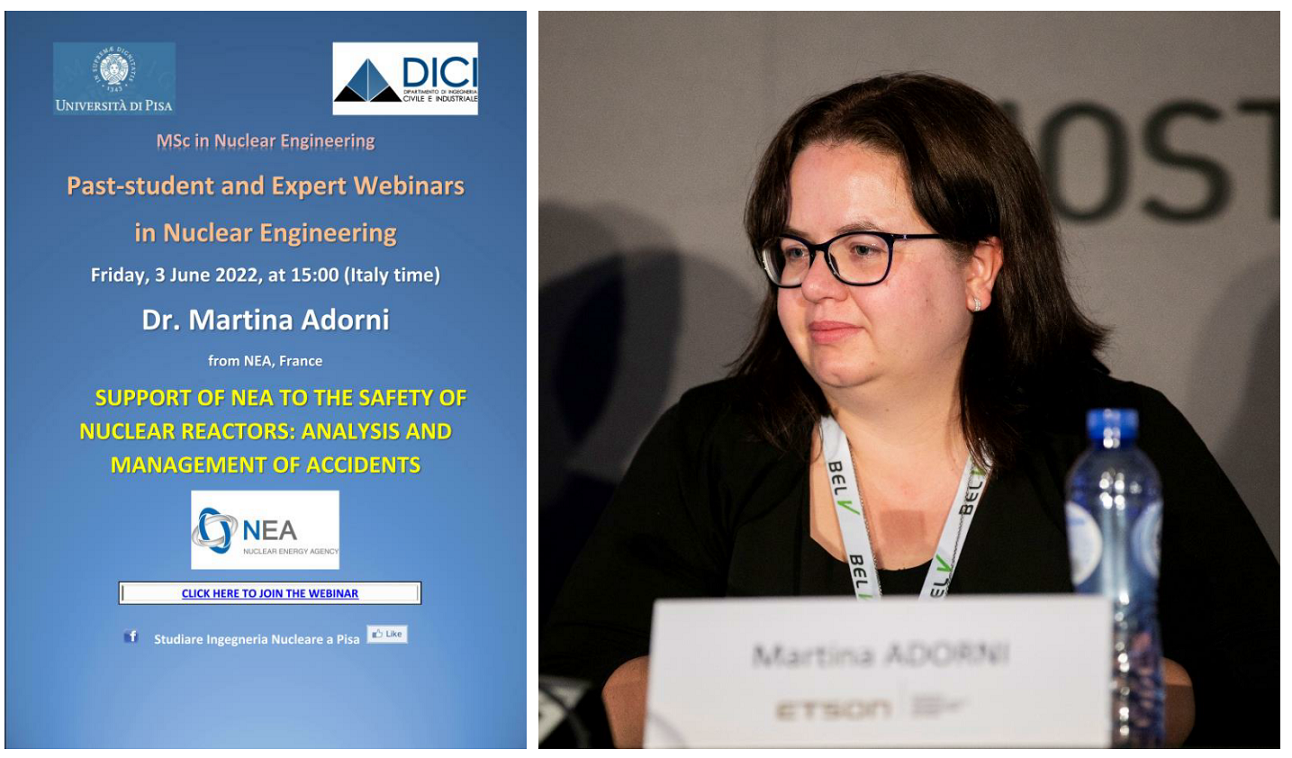
Martina Adorni is a Nuclear Engineer, holding a PhD in Nuclear and Industrial Safety from the University of Pisa. She acquired experience in nuclear safety, through the participation to national & international projects and working groups (OECD, EC, IAEA, USNRC, ETSON), while working at the NEA, Bel V (Belgian TSO) and University of Pisa as reported below:
- Since 2020 she is Nuclear Safety Specialist at the NEA. She provides support to working groups involved in nuclear reactor safety and regulation and, specifically, in the groups dealing with accident analysis and management and safety research.
- She was Safety Analyst at Bel V (Belgian TSO) since 2012. She was coordinator of the Bel V R&D. and she was involved in the evaluation of nuclear safety assessments on severe accidents in Belgian nuclear installations.
- She started her research activities as student at University of Pisa at the San Piero a Grado Nuclear Research Group (GRNSPG) in 2003. From 2007 to 2012 she was involved in the preparation of the final safety analysis report for the fuel behaviour-related activities for the Argentinean NPP Atucha-2.
- In parallel, she had been safety advisor for the transport of dangerous goods by road for more than 10 years.
Webinar by Danilo Giulietti on Friday June 10, 2022 at 15:00
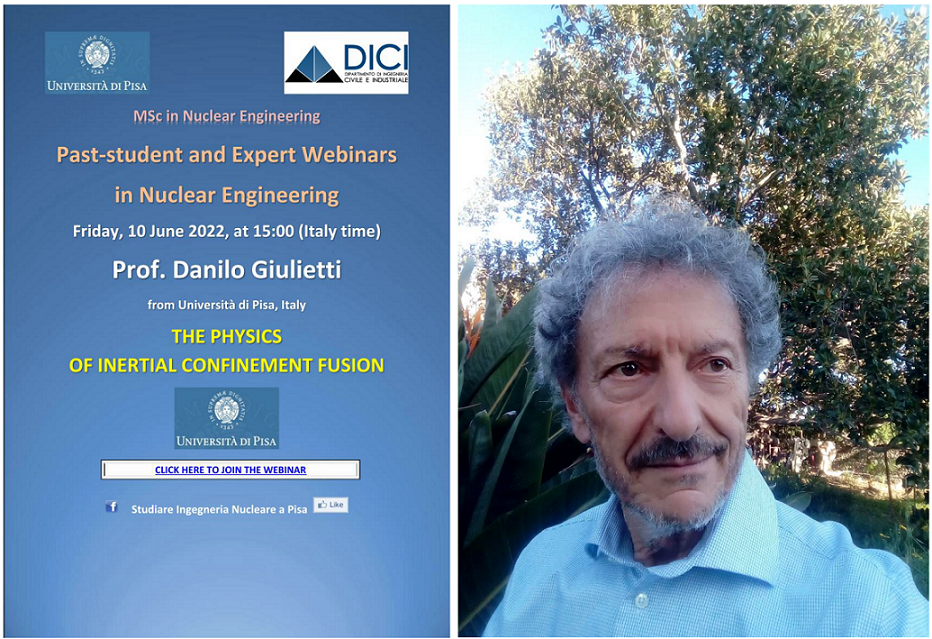
Danilo Giulietti graduated in Physics (110/110 cum laude) at the Pisa University and soon after received the PhD at the Scuola Nornale Superiore. He has carried out the majority of the scientific and teaching activity at the Department of Physics "E. Fermi" of the Pisa University, as professor of Structure of Matter, Classical Electromagnetism and currently Quantum Optics and Plasmas. His research fields include atomic and molecular physics, electron and nuclear magnetic resonance, thermal radiation, phase transitions, laser-produced plasmas, physics of controlled thermonuclear fusion, lasers, holography and interferometry, ultra-fast electron optics, pulsed X-ray sources and their applications, X-ray spectroscopy, ultra-intense and ultra-short pulsed lasers, laser-matter interaction at relativistic intensities, acceleration of particles in plasmas and related applications. He is the author of over 250 publications in international journals and over 300 communications at national and international conferences, many of which by invitation. He has been responsible for various international scientific initiatives and has organized international conferences on the topics of his research activity. He has been a member of the National Institute of Matter Physics and associated with the National Institute of Optics (CNR). His studies on the acceleration of particles in plasmas led him to associate with the National Institute of Nuclear Physics, where he had a Research Assignment aimed at the study and development of New Acceleration Techniques for electrons and ions based on plasma-lasers. He was the National Representative of the Strategic Project of INFN called PLASMONX (plasma acceleration and production of monochromatic and tunable X-ray radiation), which led to the realization at the National Laboratories of Frascati (LNF) of an installation equipped with a Ti laser : Sapphire (6J in 20fs @ 10Hz) for studies on New Plasma Acceleration Techniques. He was the National Representative for INFN of the European Projects ELI (Extreme Light Inftrastructure) and HiPER (High Power laser Energy Research facility). He collaborates with the ENEA Research Center in Frascati on the issues of Controlled Thermonuclear Fusion.
Webinar by Jeff Lane on Friday June 24, 2022 at 15:00
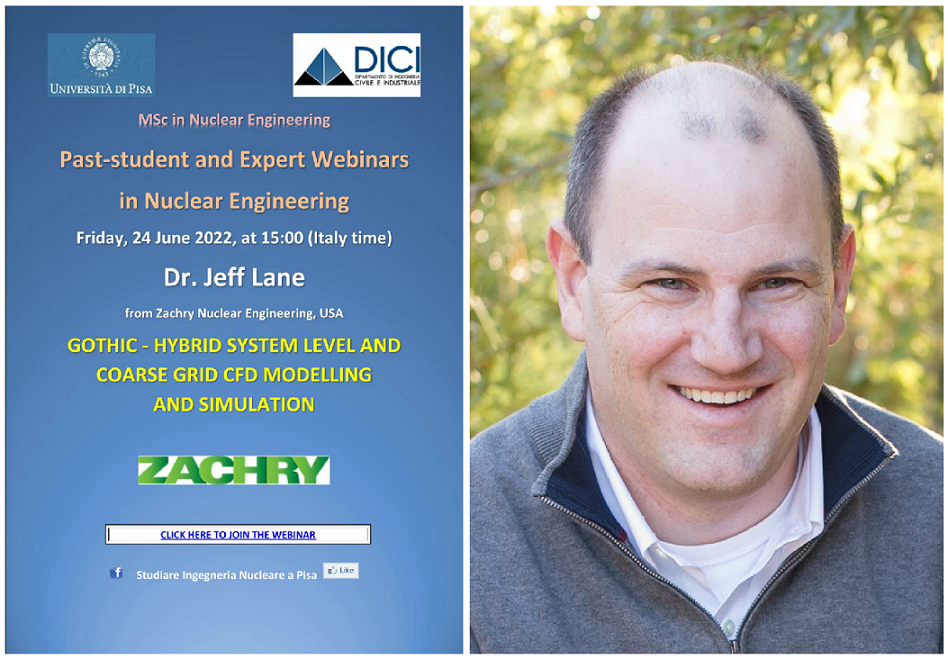
Dr. Jeff Lane’s background is in software development, computational thermal-hydraulics and reactor safety analysis for both existing LWRs as well as next generation SMR and non-LWR concepts. Currently he is the technical lead and program manager for the GOTHIC coarse-grid CFD software. His expertise is in multi-physics and multi-scale methods, Verification, Validation, and Uncertainty Quantification (VV&UQ), software quality assurance (SQA), Evaluation Model Development and Assessment Process (EMDAP), and Best-Estimate Plus Uncertainty (BEPU) methods. Dr. Lane has also been involved with development of digital twins, the application of machine learning to guide simulations, accident management and data-driven modeling. Prior to joining Zachry Nuclear, Dr. Lane worked for the Bettis Atomic Power Laboratory, where he was responsible for advancing simulation capabilities and multi-physics methods to support existing and future applications. Dr. Lane received his Ph.D. from Pennsylvania State University where he studied under the Rickover Fellowship Program in Nuclear Engineering.
Webinar by Eva Andersson on Friday July 1, 2022 at 15:00
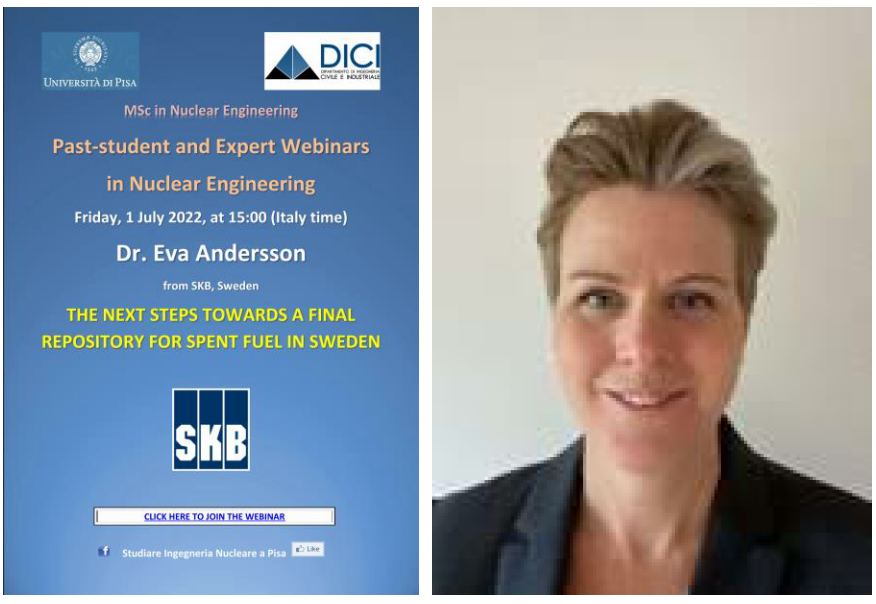
Eva Andersson is head of Research and Post closure safety at Swedish Nuclear Fuel and Waste management co. She has a PhD in limnology from Uppsala University. She has worked for Swedish nuclear fuel and waste management Co since 2006. In the first years she worked as a researcher with site description and analyses of post closure safety. She has published articles related to effects on long term safety of radioactive disposal facilities by human intrusion, landscape evolution, uptake and transport of elements in biota and ecosystems. From 2011 she worked as project manager in assessments of post closure safety and since 2018 she has worked as head of different departments including Requirements and safety assessments, Porfolio management, and currently Research and post closure safety.
Webinar by Lucia Sargentini on Friday July 8, 2022 at 15:00
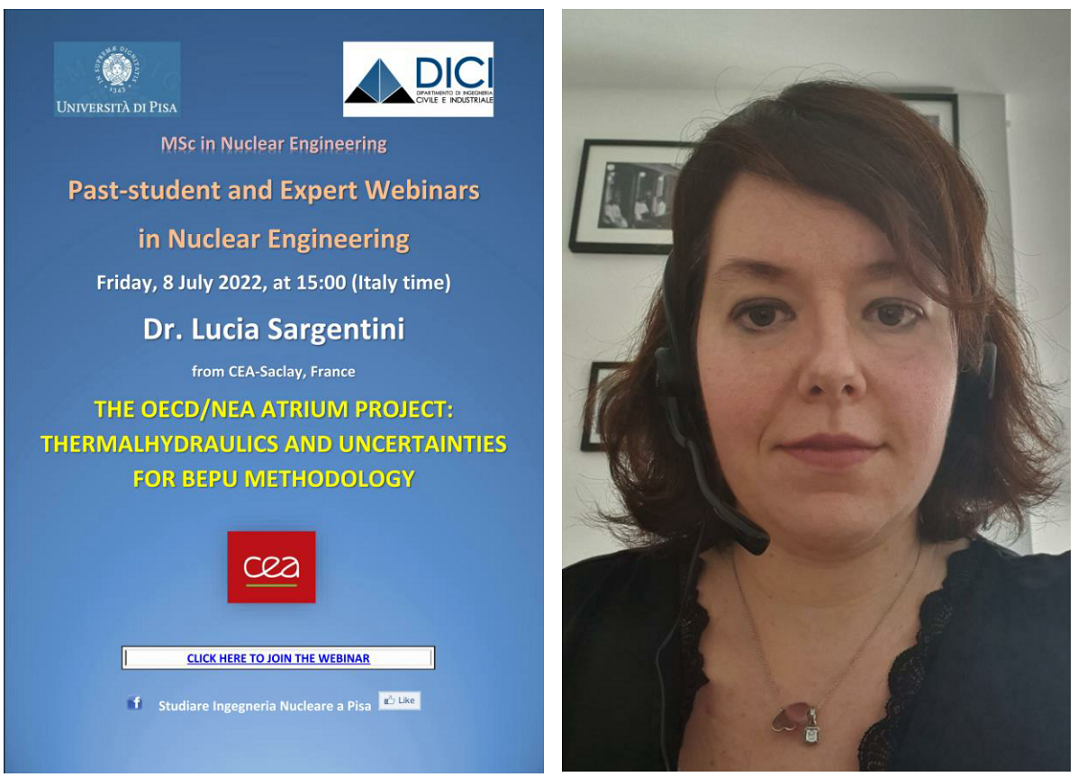
Dr. Lucia Sargentini is a research-engineer at Commisariat à l’Energie Atomique et aux Energies Renouvables (CEA) in Saclay. Since 2015 she has been involved in safety studies for CEA’s research reactors, in experimental analysis for physical modelling and validation of T-H system codes and in the inverse uncertainties quantification in Best-Estimate Plus Uncertainty methodologies. She graduated in Nuclear Engineering at University of Pisa in 2011, after an intership at CEA-Saclay on heat transfer transient during reactivity accident in research reactors. She holds a PhD (2014) in Fluid Mechanics at Université Pierre et Marie Curie (UPMC) in Paris on fluid-structure interaction for sodium reactor assemblies.
Webinar by Luciano Cinotti and Elisabeth Rizzotti
on Friday July 15, 2022 at 15:00
Luciano Cinotti - Chief Scientfic Officer
A nuclear engineer, he worked at Ansaldo for 30 years and is a leading expert in Fast Reactor technologies. A Euratom representative and the Chairman of the LFR (Lead Fast Reactors) Steering Committee of the Generation-IV International Forum from its inception until 2010, he is the author of most of the world’s LFR-related patents.
Elisabeth Rizzotti - Chief Operating Officer / MD Italy
A physicist, after a brief spell at CERN, she left physics to embrace the world of finance, working first for leading international consulting companies and then for several Italian commercial banks where for 30 years she developed her strong managerial expertise.
Webinar by Anelia Koleva on Friday July 22, 2022 at 15:00
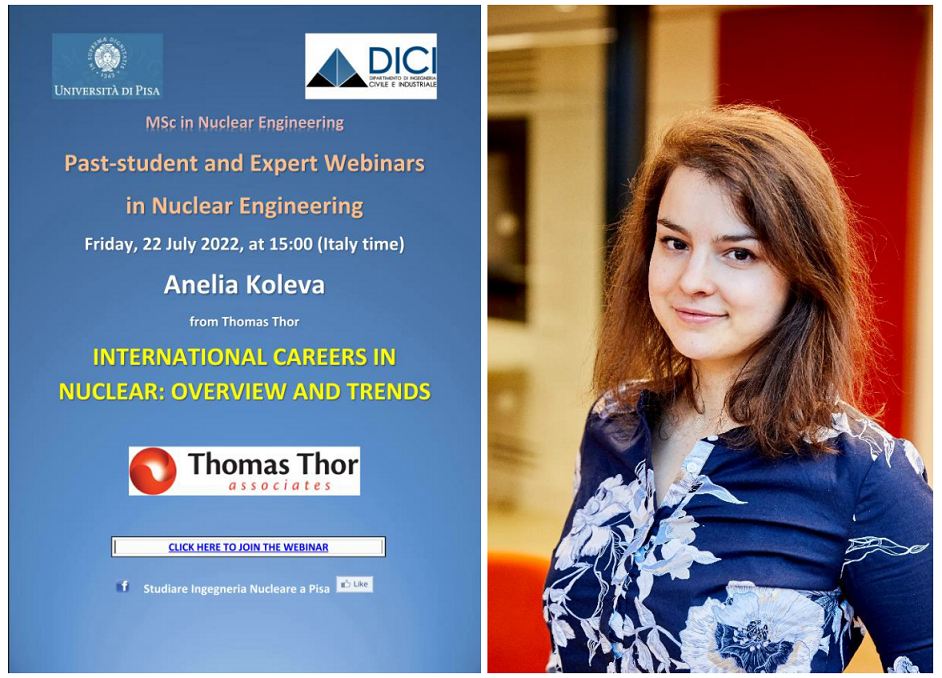
Anelia Koleva is a Principal Nuclear Recruitment Consultant at Thomas Thor. She has been working in nuclear industry recruitment since 2015 and is specialised in the Continental European markets, including projects varying from large civil new build, operations, decommissioning, as well as research reactors and SMRs.
Thomas Thor provides recruitment, leadership search and workforce consulting services to the global nuclear Industry and organizations shaping a net zero future. Founded in 2009 on a belief in a clean energy future and in the power of human ingenuity to create a better world, the company vision is to enable the acceleration of net zero through the mobilization of knowledge and talent. Every day the company’s global network of consultants strive to build and sustain the global workforce of critical sectors, with a focus on the full breadth of the nuclear industry.”
